~ In Memoriam: John Thorogood (1933-2022) ~
*Note: Since its initial publication, this post has been edited at the request of a family member who wishes to remain private.
On a hot summer afternoon in London I made my way to the Thorogoods. A few months earlier, their eldest daughter, Cathie, who lives in Australia, had discovered this blog and my connection to her grandmother’s family—the Gaitanopoulos—and suggested I visit her parents next time I passed through town. I dropped them a line when I was planning a stopover and they invited me over without hesitation.
So here I was in June 2017, ringing the doorbell at a house on Trinity Rise, Tulse Hill, just south of Brixton. I was greeted warmly by John, his wife, Janet, and a pooch. We settled down, I deployed the tools of my trade—laptop, photo scanner, audio recorder—and we started talking about family stories as I riffled through their boxes of photos. I was thrilled to be meeting them. John, although not a direct relative, is nevertheless a member of my extended Jerusalem tribe.
Tall and still handsome at 84, he had begun succumbing to dementia. He struggled with names of people and places but there was no doubting that the pictures in his mind were vivid. I’m sadly familiar with this cruel disease, my father having been one of its victims, so I wasn’t surprised to see that the emotional imprint of his Jerusalem childhood remained strong in him, even as the facts began to elude him. Thankfully, Janet was well versed in his family’s history, having heard it from her mother-in-law for years, and could fill in, which she did in a calm, even-keeled manner.


Whenever I stumbled on an interesting image, I fed it to the scanner. There were so many photos, and I was concerned about messing up their order but they assured me there was none. They were just as John’s mother had left them before she died in 1983.
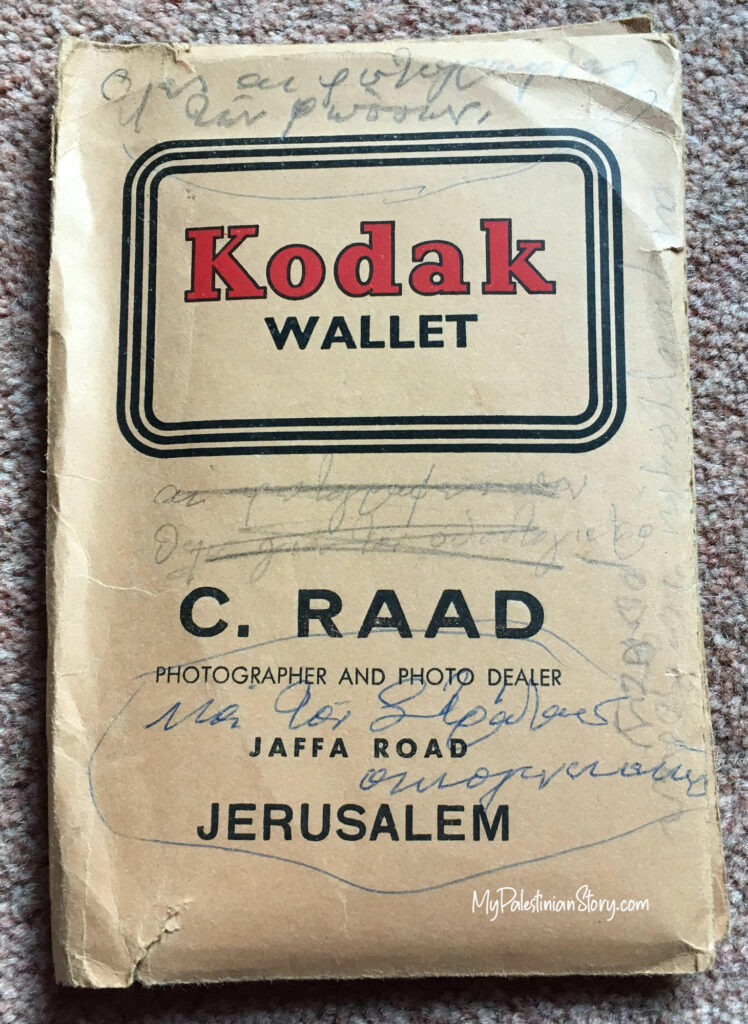

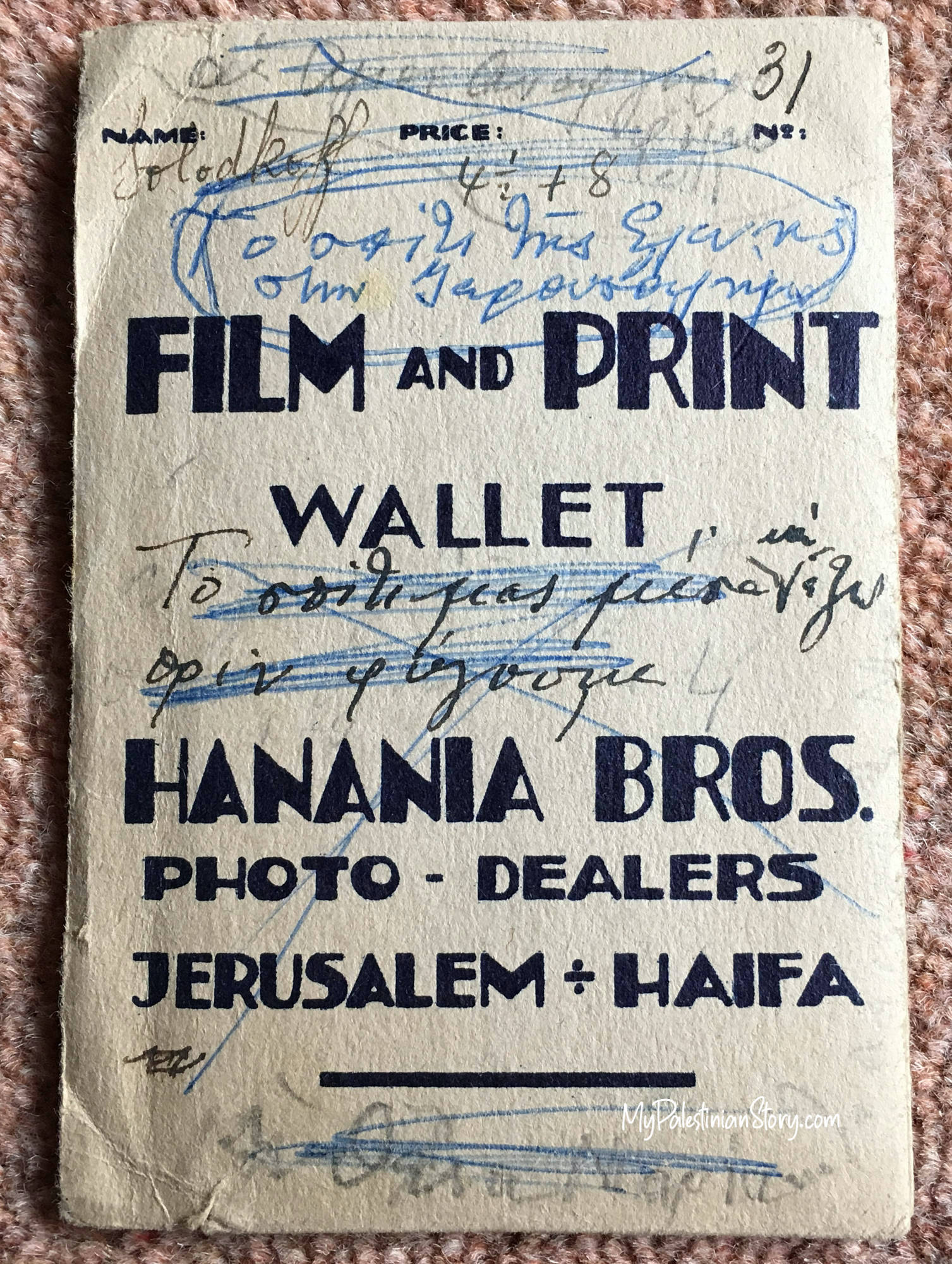

When we finished, John gave me a tour of the house which has been in the Thorogood family for six generations. The walls are covered with stories of the past: some photographs but mostly paintings by his mother, Marika Gaitanopoulou, a most prolific and talented painter.
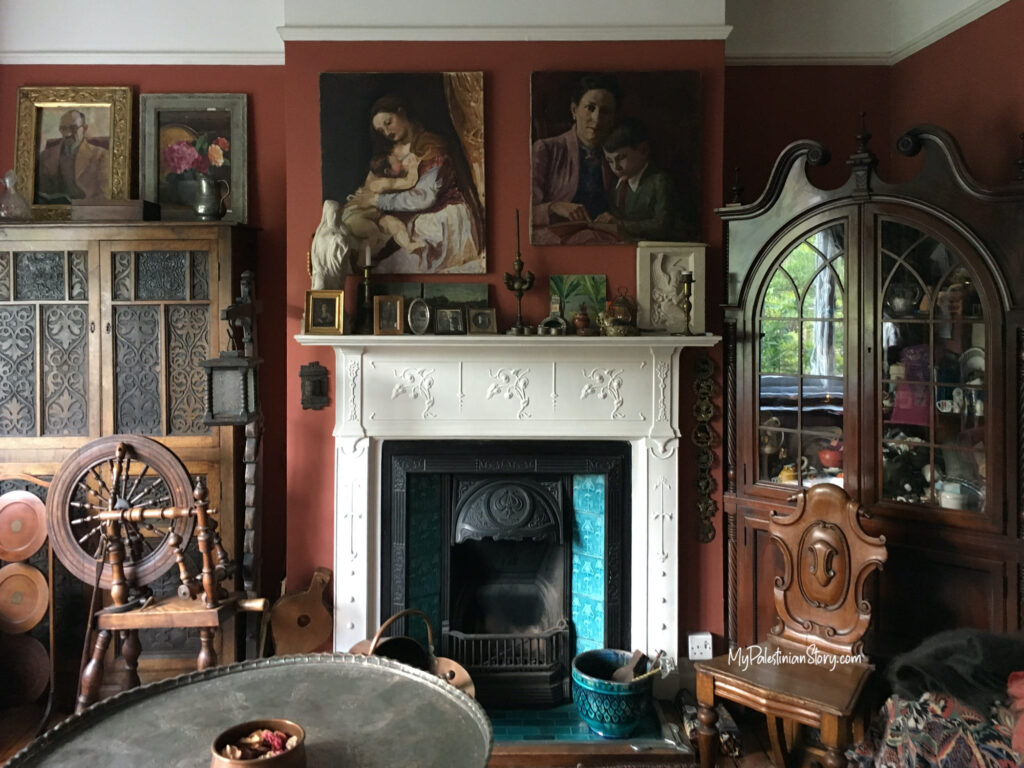
I’ve kept in touch with the family since then, and also connected with Cathie’s sister, Marika. I was sad to learn that John’s dementia has progressed and even sadder when on 10 Aug 2022 Cathie wrote that her father had taken his last breath that evening.
As a means of honouring his memory, I thought I’d write about his maternal family, the Gaitanopoulos, and how our families are connected.
Origins
This is the story I’ve managed to piece together which no doubt has many holes in it. Like all my blog posts, this is not written from an authoritative perspective but rather as an invitation for information to be added and corrected.
The Gaitanopoulos, a Greek family, hailed from Çanakkale (aka Dardanellia) in Turkey. Sometime in the mid to late 19th century, three Gaitanopoulos siblings were brought to Jerusalem by a Greek Orthodox cleric whose name is legendary in the Holy City. Archimandrite Efthymios was the Treasurer of the Greek Orthodox Patriarchate, a powerful figure, who amongst other things created the market next to the Holy Sepulchre known as Suq Aftim (Aftim being an Arabised version of his name). He was also the siblings’ uncle.
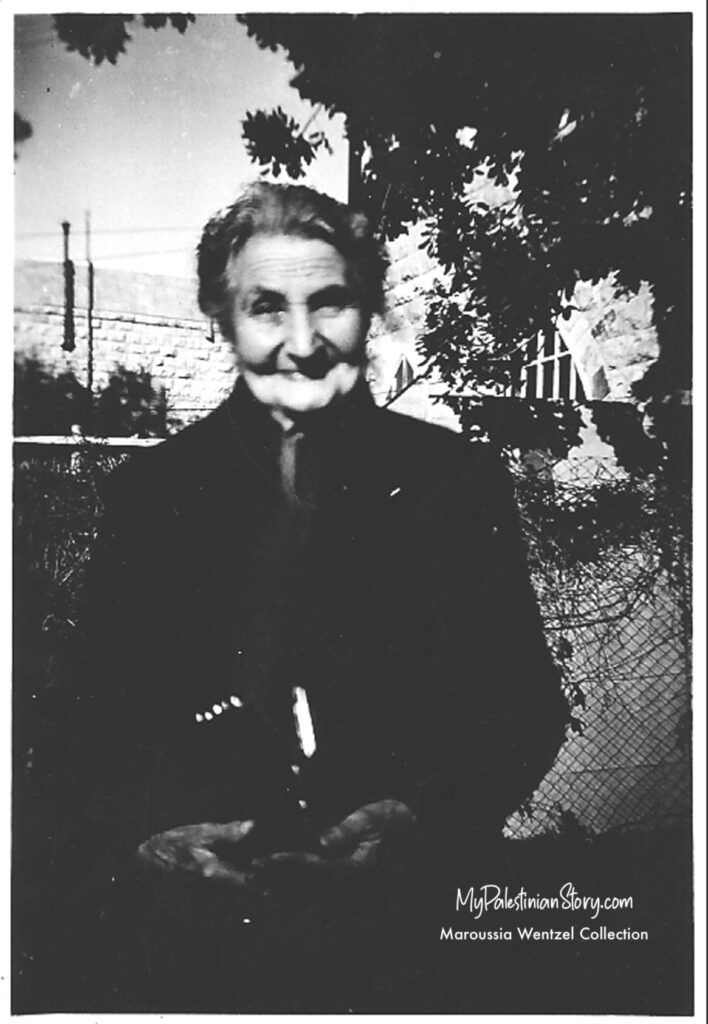
(Maroussia Wentzel photo collection)
Sometime earlier, not far from Çanakkale, on the Greek island of Lesvos, Demetris (Demetrios, in formal Greek) Gaitanopoulos—the eldest, I believe, of the three siblings of our story—was apprenticed as a carpenter to a well-off man, perhaps a dragoman, by the surname of Drakoulis. When Drakoulis’s wife died, leaving him with a daughter, Erifeely, he remarried. He had at least one daughter with his new wife and perhaps two boys. Erifeely was close to her half-sister. Yet, according to one source, the new wife fit the stepmother stereotype: she did not like Erifeely, would beat her and wanted her out of the way. So Erifeely was married off to the apprentice who was given a handsome dowry consisting mainly of property on the island (which the descendants own to this day).
Somehow, Demetris and Erifeely along with Demetris’s sister Kalliope and brother Christakis, and perhaps the latter’s spouses (Yorgos Ioannides and Efrosini, respectively) found themselves in Jerusalem thanks to Arch. Efthymios. As with most family stories, the further you dig into the past the fuzzier it gets—and up to here it is definitely all quite fuzzy.
Jerusalem
Jerusalem proved to be fertile ground for the Gaitanopoulos. With the support of their uncle, they thrived: they built houses, families, rich lives.
Of the three siblings, only Demetris had children: the six we shall speak of here and six more who died at a young age, at least some from whooping cough.
All the children were born in Jerusalem. The family lived in a beautiful big house that Demetris built around 1912 in Upper Baqa’a, one of the new neighbourhoods which was just being developed south of the old, walled city, on land he acquired through his uncle Efthymios.
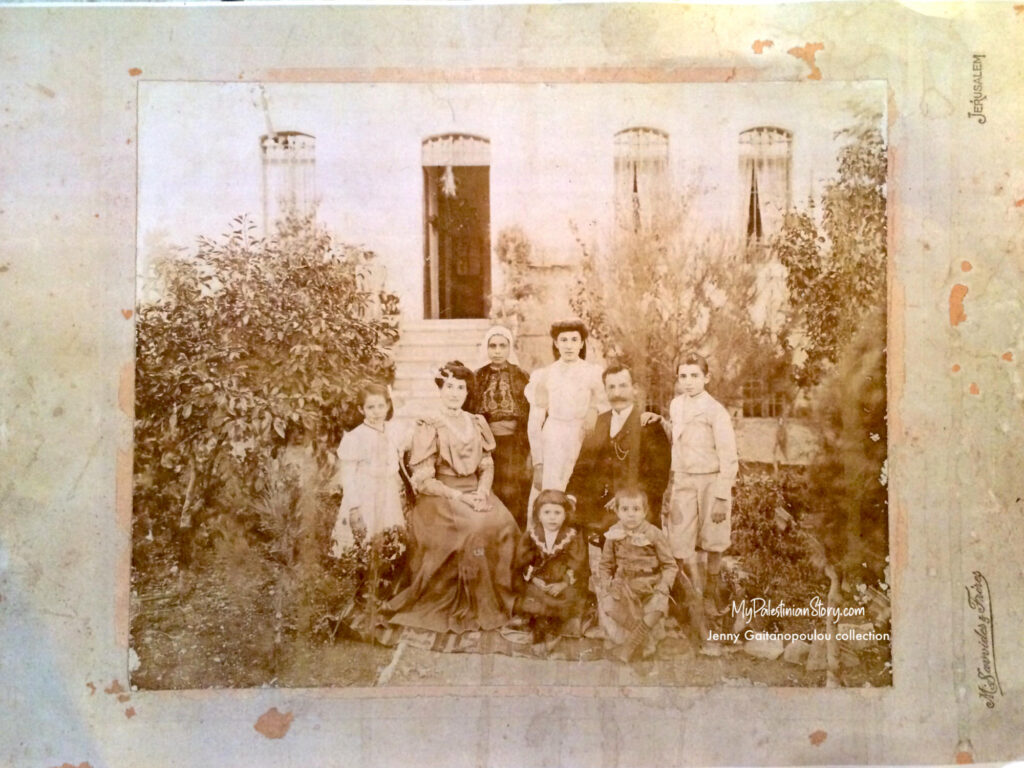
Photographed by M Savvides
(Jenny Gaitanopoulou photo collection)
The six surviving children were, in order of their birth: Marika, Panayiotis (aka Panos), Eleni, Efthymios, another brother*, and Evangelia (aka Evangelitsa, or Angela in English). Demetris died in 1926.
And to get straight to the point: our family’s connection to the Gaitanopoulos is through Efthymios. He was born in Dec 1904 and at the age of 16 emigrated with a friend to North America where he stayed for just over a decade. He got involved in the insurance business, worked for Sun Life of Canada, and upon returning to Jerusalem was appointed representative of Gresham Life, Legal and General Insurance for Palestine, Jordan and Lebanon. He also met my grandmother’s sister, Marika Schtakleff, who within a year became Marika Gaitanopoulou. (Meantime, his sister by the same name had become Marika Thorogood. But we’ll get to that later.)
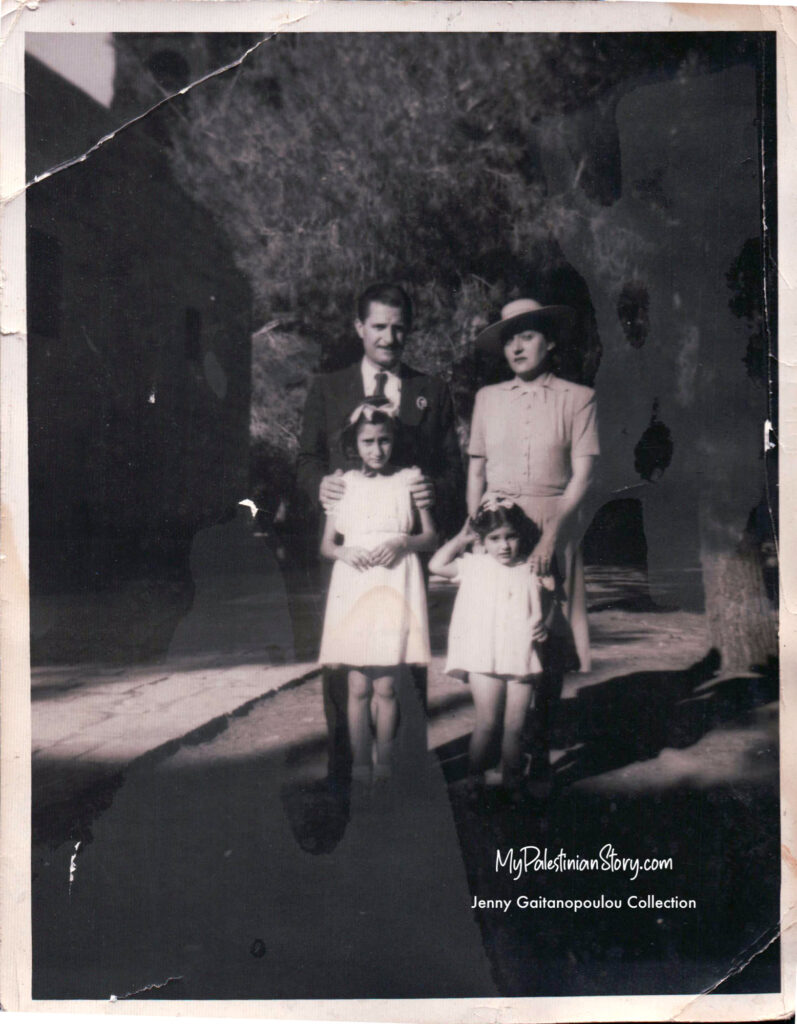
at St Simeon Church, Katamon – Jerusalem, early 1940s
(Jenny Gaitanopoulou photo collection)
Efthymios and Marika had two daughters, Feely (b 1933) and Jenny (b 1938). The girls were very close to my mother and her younger sister. They continued to be so when my grandfather’s and Efthymios’s families found themselves in Cyprus as refugees, following the partition of Palestine, and shared a home for some time. I grew up with these two aunts in my life, and I was as close to them as I was to my mother’s sisters, particularly to Jenny who stayed on in Cyprus. Feely married and moved to Canada. It made no difference that they were my mother’s cousins. They were just like her sisters—both to her and to me. And thus the Gaitanopoulos were part of our family.
The House on Bethlehem Road
The Gaitanopoulos house was on a corner of Bethlehem Road. There were several Greek families in the neighbourhood. On one side were the Abougelis, on the other the Seherlis; further down the road, the Louisidis; up the side street, the Seraphim. Incidentally, Edward Keith-Roach, Governor of Jerusalem, lived two doors down. And a lifetime later, John’s son, Alex, would have Keith-Roach’s grandson as one of his teachers in London.
Aunt Feely, whose memory is amazing and is a fount of family stories, recently described to me the interior of the house and its residents the way she remembered it all as a young girl, which would be in the late 1930s to mid-1940s.
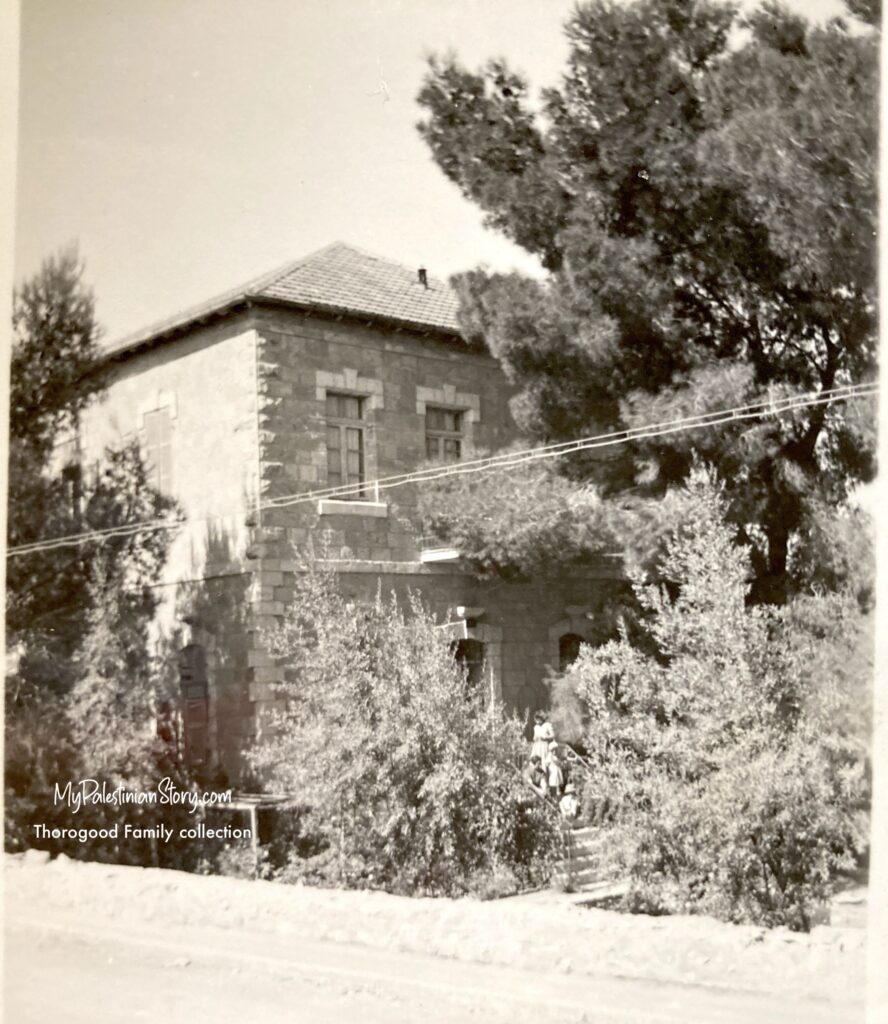
(Thorogood Family photo collection, via Cathie Cahill)
The house was set back from the street with a large garden at the front which featured a fountain. A few steps up led to the ground floor (slight misnomer). To the right, there was a big living room and dining room.
Opposite, on the left, was the room of Panos and his wife, Anna. Panos studied pharmacy in Beirut and met Anna Raisi, a Greek woman, when he was a lodger at the house where she lived with her mother. After marrying, they spent some years in Ismailia, Egypt. Eventually they came to Jerusalem where in 1941 Panos partnered with Theodoros Ninos to open a pharmacy, just inside Jaffa Gate. During the Second World War, Panos and Anna took under their care a little girl, Elenitsa, perhaps five or six years old. She was a relative of Anna’s from Greece, both her parents had died during the war, and the girl had been looked after by her grandfather until he could no longer do so.
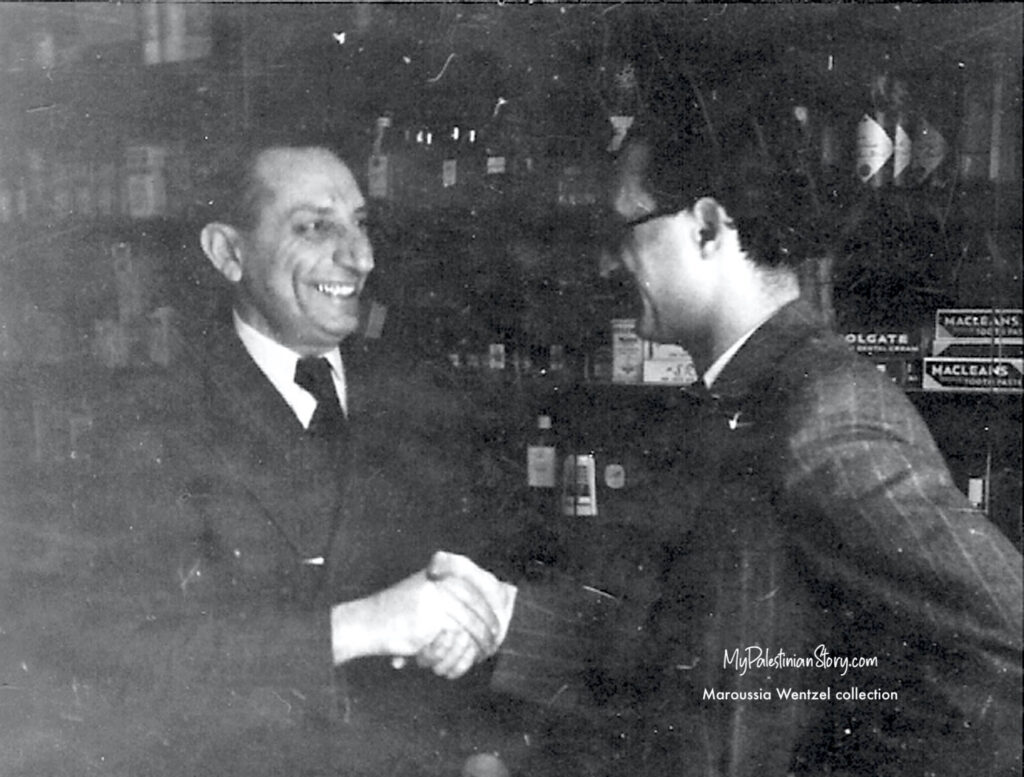
1941 or later.
(Maroussia Wentzel photo collection)
The dining room on the ground floor hosted the Gaitanopoulos’s get-togethers. There was a small balcony there, too, where the grandchildren would gather around Yiayia Erifeely and Nouna Kalliope. (Nouna in Greek means godmother. She must have been at least one of the children’s godmother.)
Feely remembers Kalliope not saying much but laughing a lot. Her room, which she shared with Erifeely, was on the ground floor (although Erifeely tended to spend most of her time on the upper floor.) From there, you’d turn left to go to a big kitchen and the bathroom.
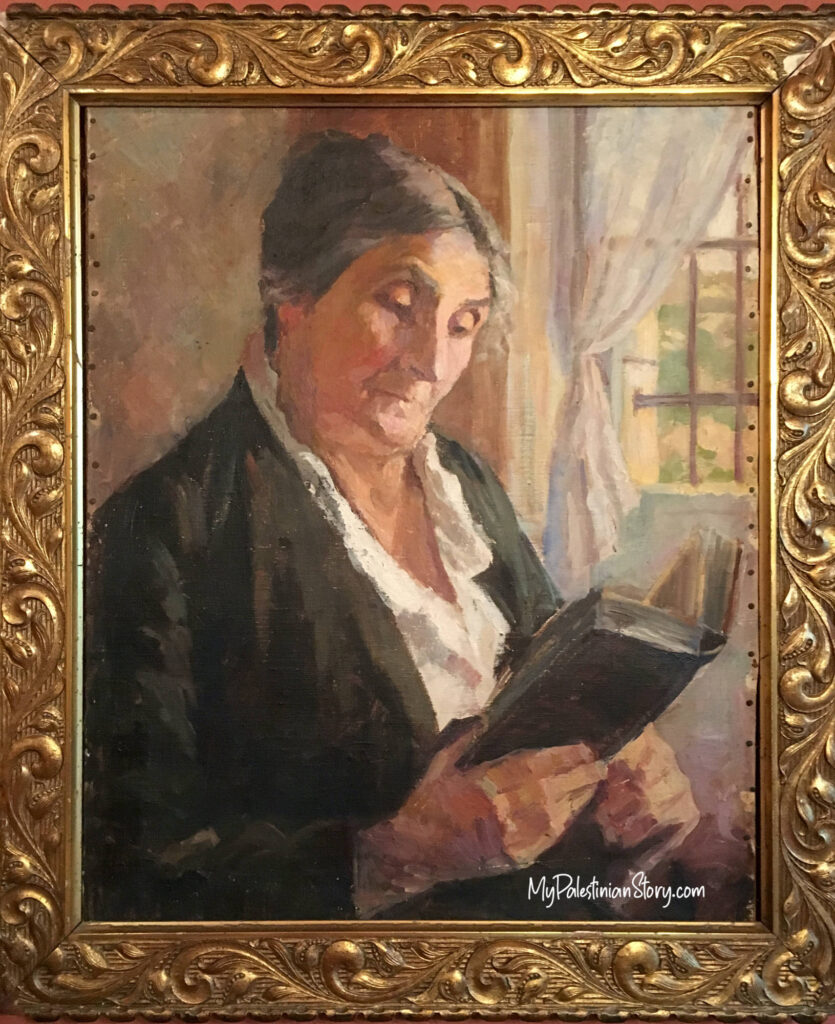

Kalliope and her husband, Yorgos (George) Ioannides, an architect, owned a house in the Greek Colony. It was designed by him in an unusual style: it was made of concrete rather than the typical Jerusalem stone (which indicates that it pre-dated the Brits or at least Jerusalem Governor Ronald Storrs’ architectural edicts.) Presumably Yorgos died before Feely’s time and I’m guessing that Kalliope went to live with her brother’s family in the big house on Bethlehem Rd. Her house in the Greek Colony was given to the family of Demetris’s middle daughter, Eleni, to live in.
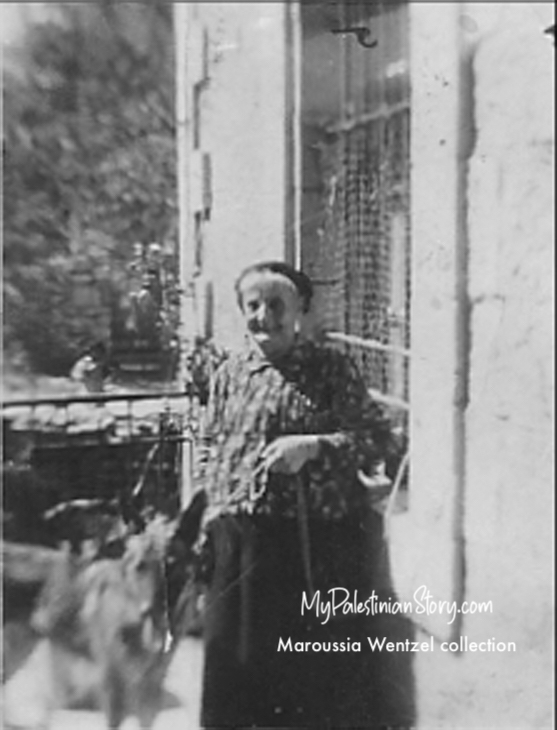

Eleni (b 1900) had lived in the Gaitanopoulos house until her marriage. She was obsessed with housework and could often be found cleaning the house, mopping the stairs. This is more or less how she met her husband, Theodor Solodkoff. A Russian who had been smuggled to Jerusalem out of Russia by his aunt following the Bolshevik revolution, he attended university in Beirut and then returned to Jerusalem where he worked for the British Mandate government. Through his work he knew Bill Thorogood and on one occasion he accompanied him on one of his visits to the Gaitanopoulos house and thus met Eleni. The couple married in October 1929 and in April 1934 they had a daughter, Maroussia.
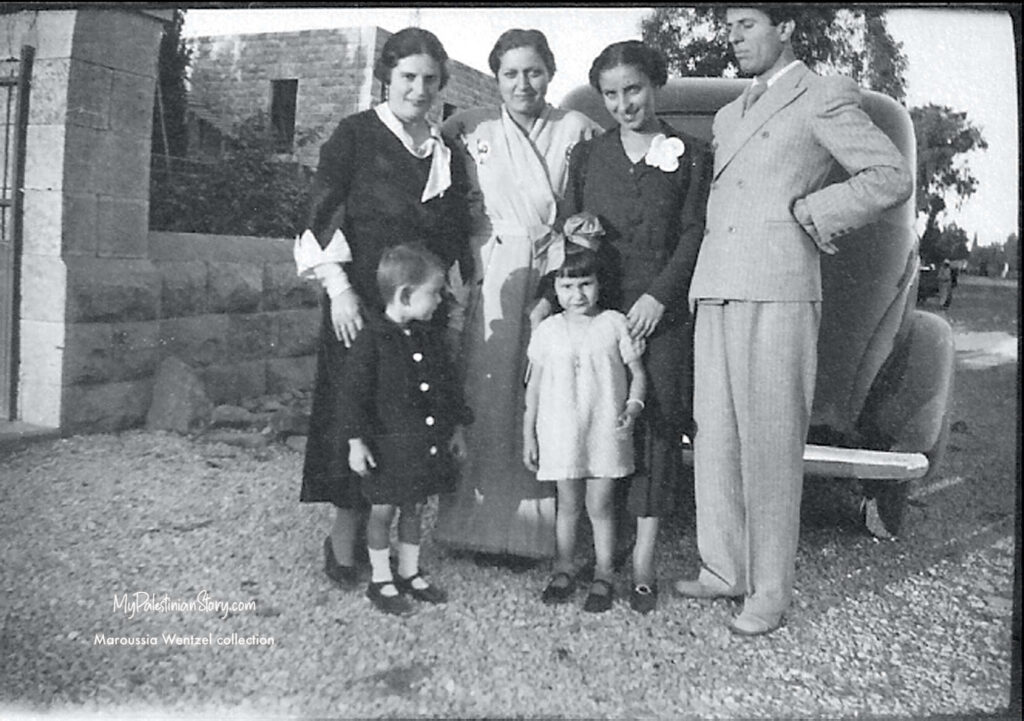
(Maroussia Wentzel photo collection)
Theodor did well at work. The Palestine Gazette of 26 Sep 1946 includes the following appointment: “Mr T P Solodkoff, Clerk Grade M, Department of Migration and Statistics, to be Chief Clerk and Establishment Officer, with effect from the 1st April, 1945.“
I was fortunate to meet Maroussia in Cyprus in 2015 when she was visiting Jenny, and to listen to her stories. (Sadly she died a couple of years after that.) She drew maps of the neighbourhoods for me as well as the layout of their Greek Colony house. She also shared many of her photos, a video of her parents’ wedding at the Gaitanopoulos house and her drawing of the house (which I’ve incorporated into the video below).
Back at the house: next to Panos and Anna’s room, there was a door leading to the semi-basement where the other brother and his family lived.
Finally, on the top floor lived the Thorogoods.
Marika was born in 1893. She survived a bout of typhus and attended a German school. Cathie remembers her saying it was a German Catholic convent which points to Schmidt’s Girls College, opposite Damascus Gate. After graduation she studied art at the Bezalel School of Arts and Crafts. She spent her time painting and sculpting: portraits, local scenes.
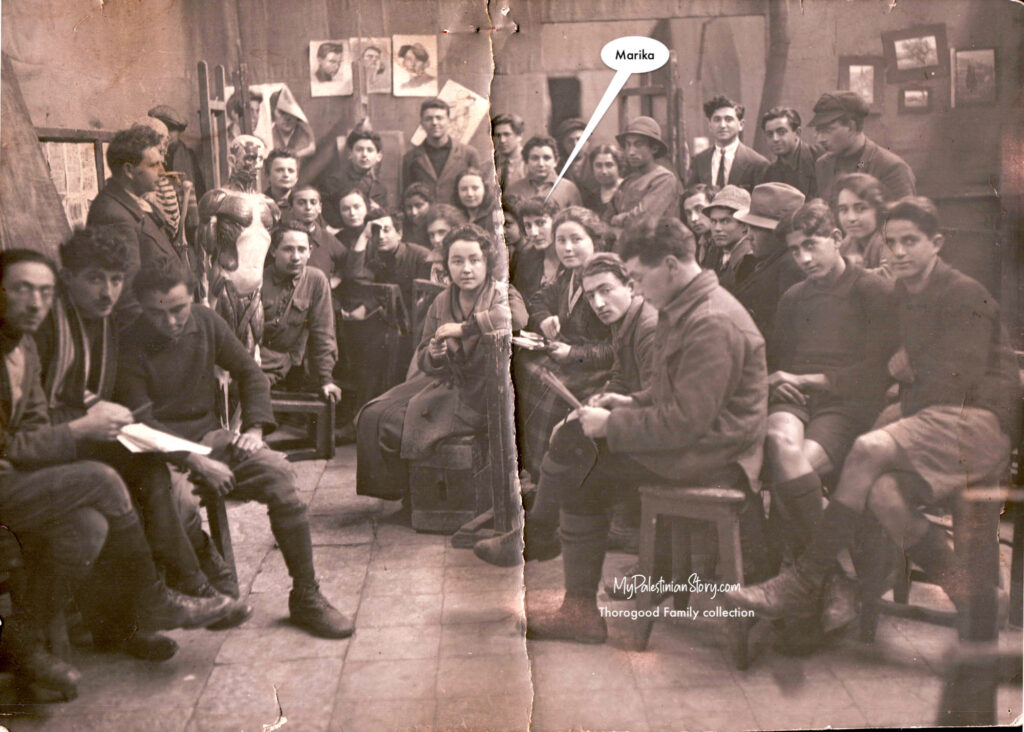
(Thorogood Family collection)
One of the portraits she painted was of Bill Thorogood—as seen below.
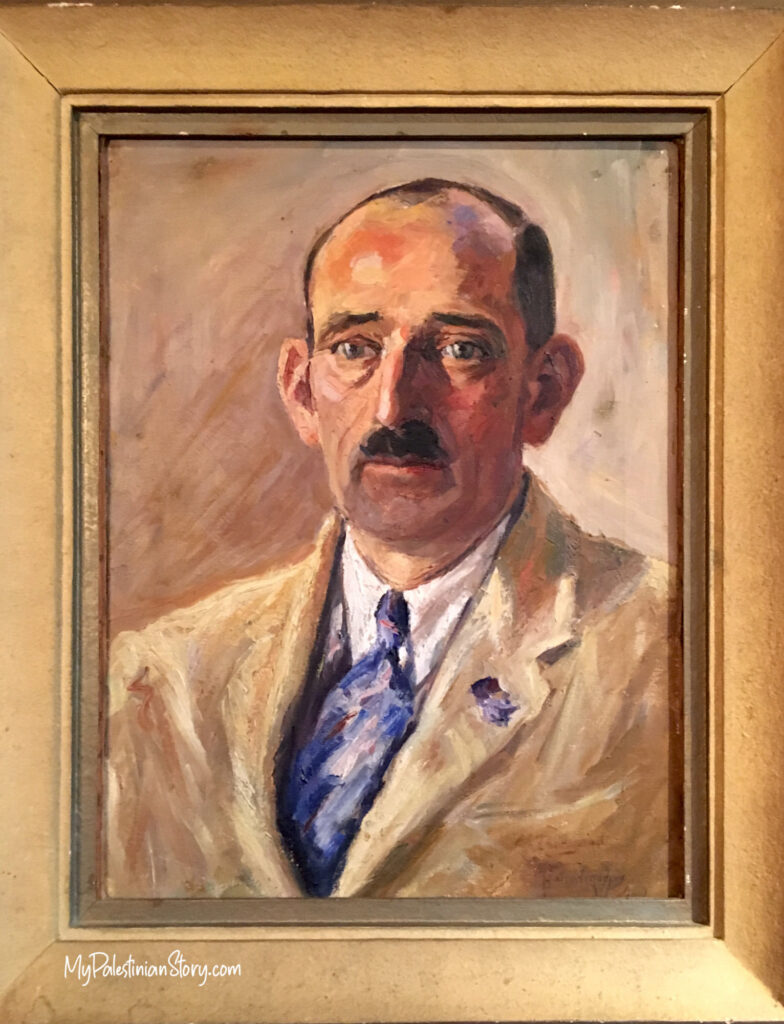
(Photographed at the Thorogood home – Jun 2017)
He was born William Austin Thorogood on 25 February 1884 in Wembley, Middlesex, England, son of John and Elizabeth.
At age 16 he fought in the Anglo-Boer War in South Africa. On an Attestation for Short Service with the Cavalry of the Line, dated 8 January 1902, he declared himself 18 years and 11 months old (although he’d be 18 the following month. Did he overstate his age to join or am I getting my arithmetic wrong?) The medical examination found him to be 5 ft 6 ½ inches (169 cm) tall and weighing 122 lbs (55 kg). His complexion was medium, his eyes hazel, his hair brown and he had a mole in the lower back. He was Church of England and fit for service in the Lancers of the Line. During the First World War he was in France.
According to a biographical note in The Palestine Post, in March 1920 he came to Jerusalem as part of the military administration and in July of that year joined the civil administration and worked in the Secretariat. But perhaps that happened earlier as he’s included in the photo below, showing the civilian staff of OETA (Overseas Enemy Territory Administration) South, dated 11 June 1920.
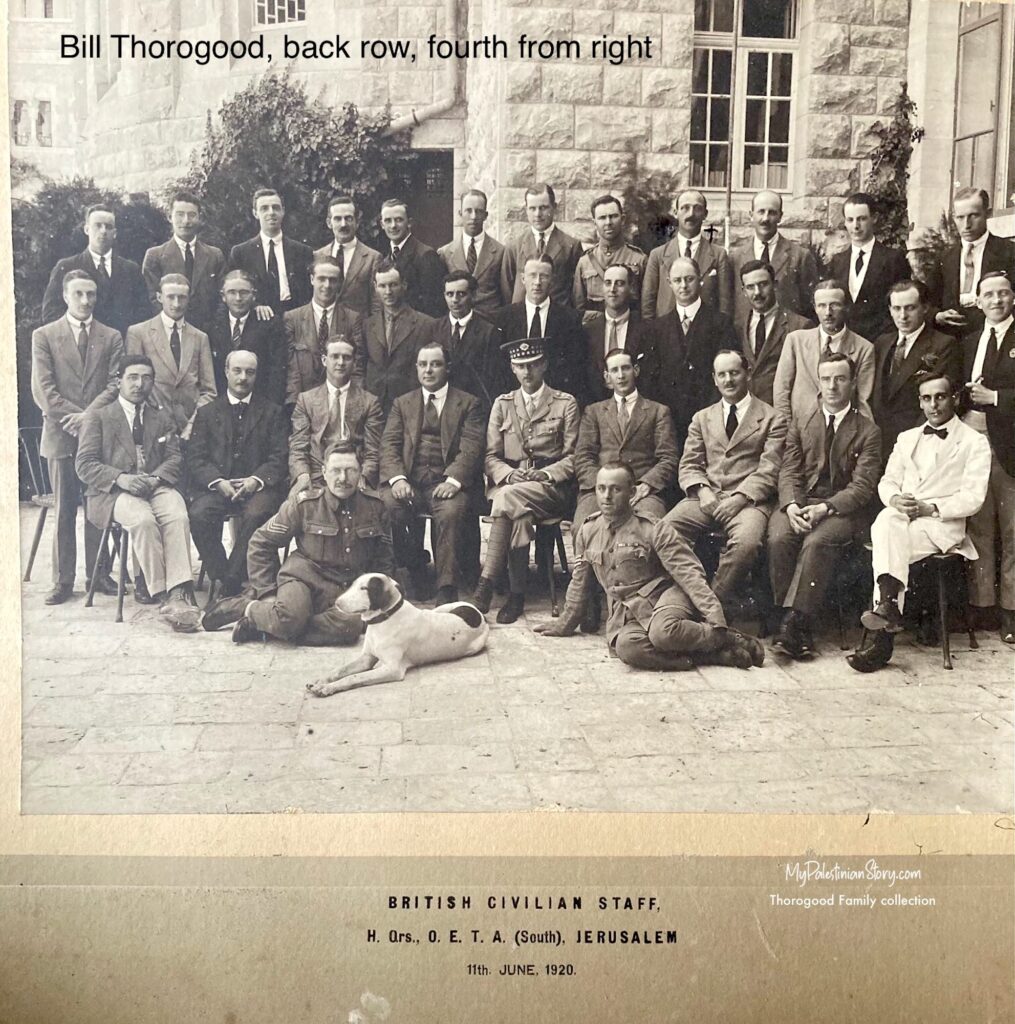
He was married at some point but his wife died of typhus and is apparently buried in Jerusalem, so that would have been in the 1920s. They had no children.
Somehow, later in the 1920s, his path crossed that of Marika’s and in pursuing her he contrived to have his portrait painted by her. (I can think of worse pickup tactics!) Marika told her granddaughter Cathie that when Bill came to the house to sit for the painting she was aware of him looking at her out of the corner of his eye. She was still being chaperoned even though she was in her late 30s. I don’t know who played gooseberry on this particular occasion. Regardless, the portrait sitting was followed by a walk down the aisle in 1930.
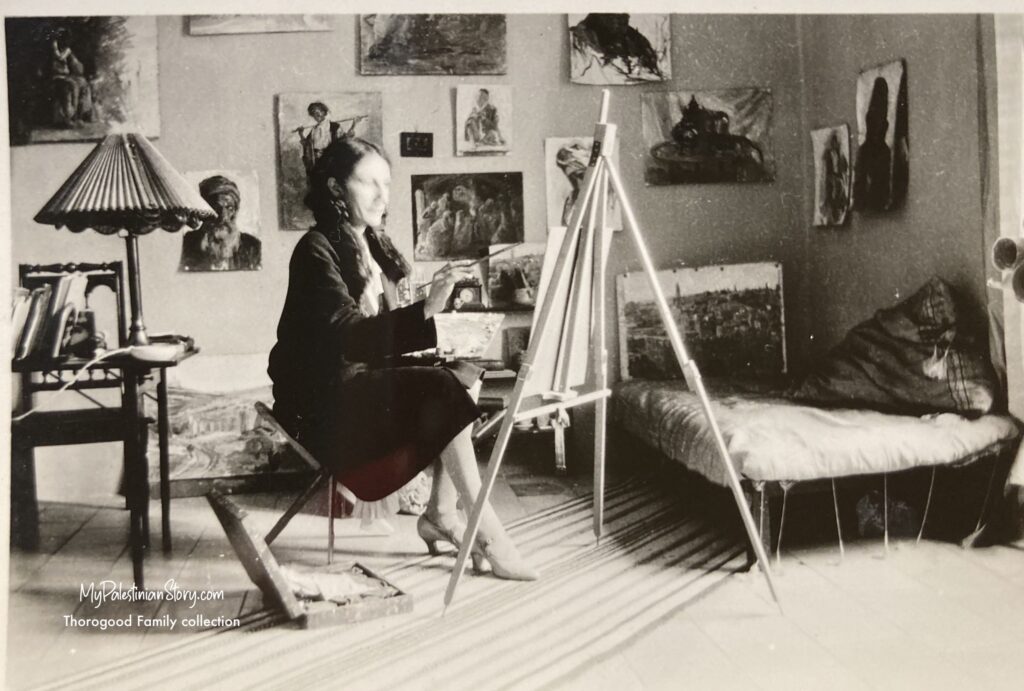
(Thorogood Family collection, via Cathie Cahill)
In 1932 Bill was transferred to the CID (Criminal Investigation Department). The Palestine Gazette in its 12 May 1937 issue includes Mr W A Thorogood of the Police Force and Prisons Service in the list of recipients of the King’s Coronation Medal.
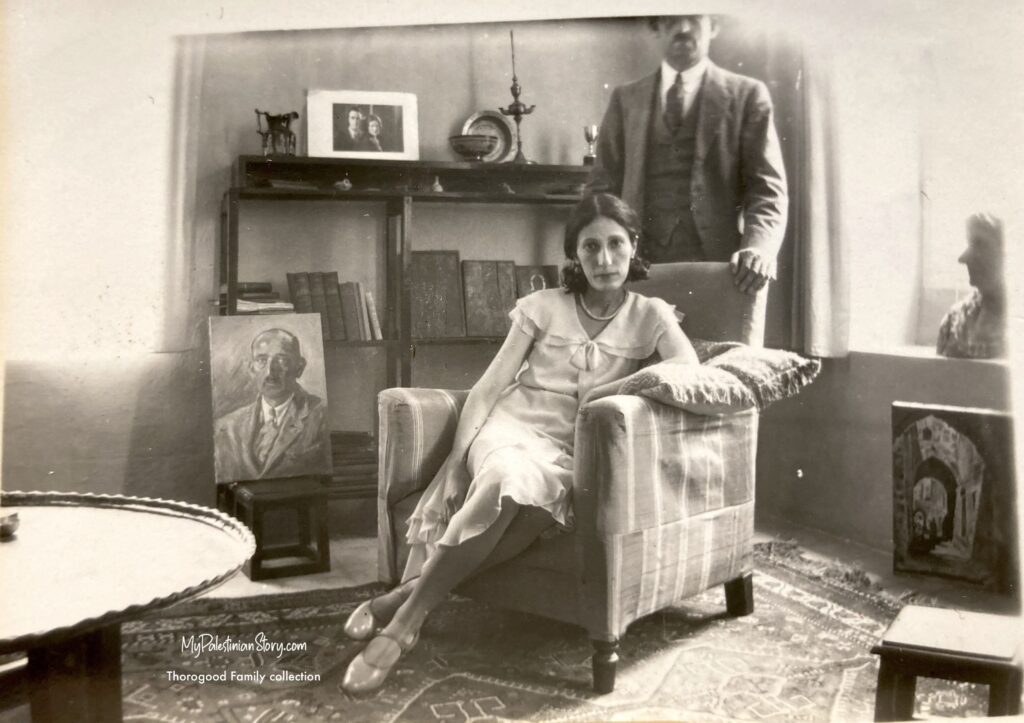
(Thorogood Family collection)
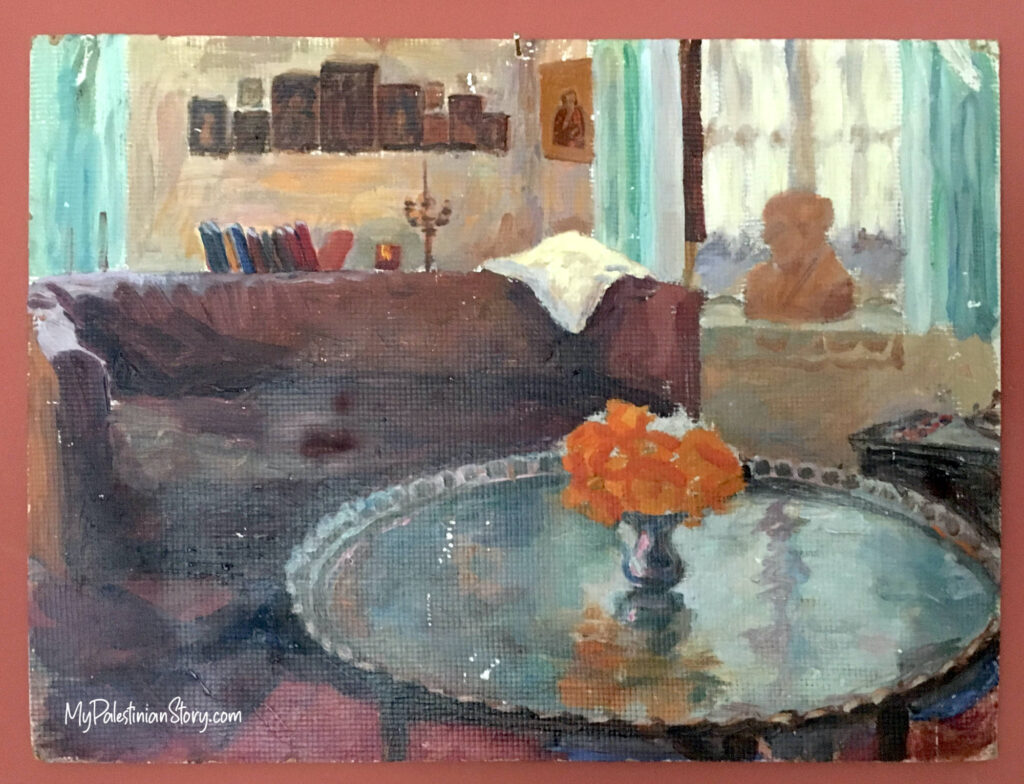
(Photographed at the Thorogood home – Jun 2017)
On 29 August 1933, the couple’s first and only child was born: John William Austin Demetrius.
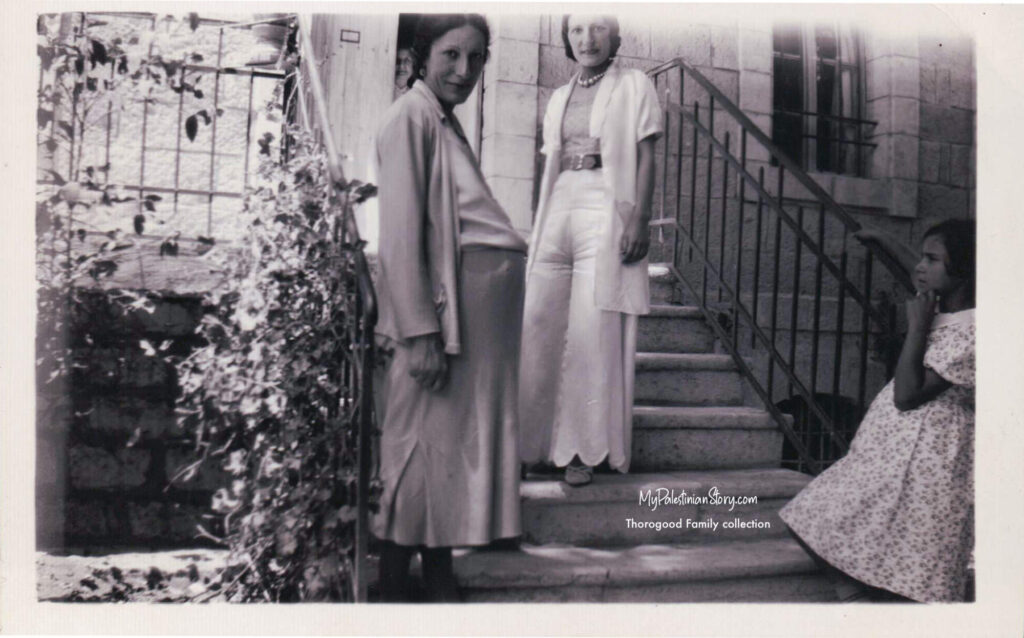
(Thorogood Family collection)
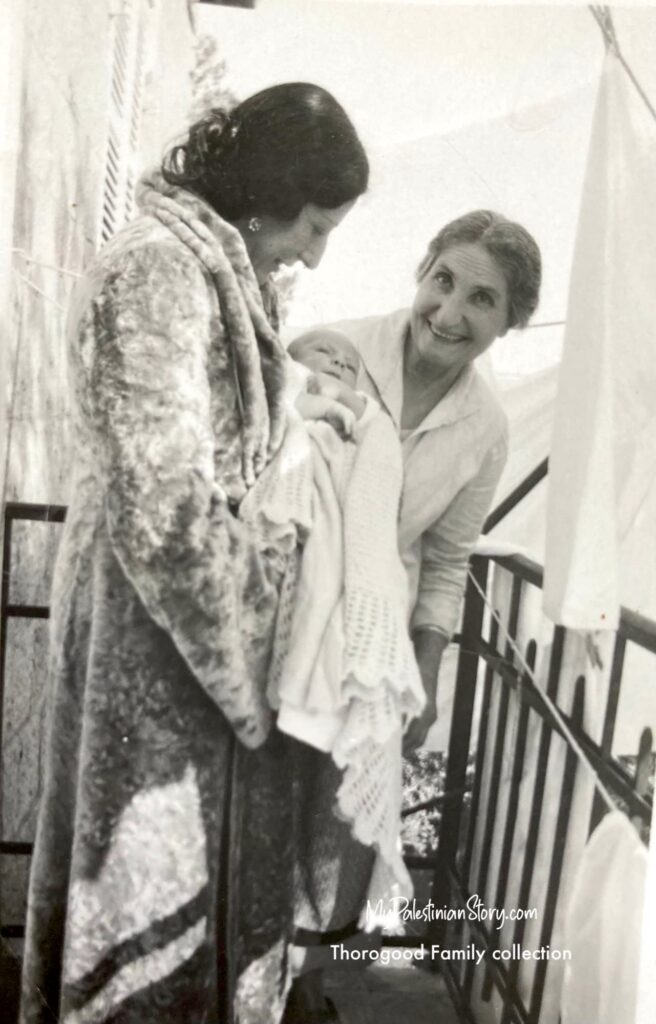

He spoke Greek before he spoke English. He also spoke Arabic—playing with the kids in the street or talking to Martha, the family’s long-time Palestinian cook. He attended an English school not far from home. He told me he used to walk to school but I couldn’t think of an English school that was within walking distance. Twitter to the rescue: I posed the question and a friend responded with the perfect fit: a private English school in the Greek Colony, which according to Google Maps is a six-minute walk from the Gaitanopoulos house.
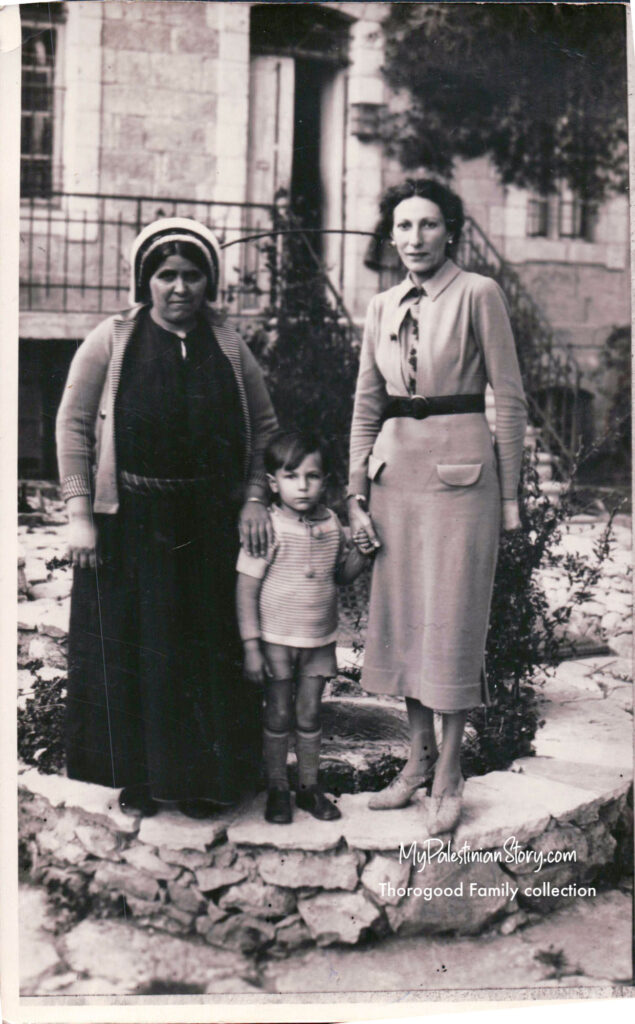

R: Photographed at the Thorogood home – Jun 2017)
Feely remembers John in Jerusalem as a good and rather quiet boy. With their cousin Maroussia, they’d play “cowboys and Indians” in the garden. (Those were such non-PC times.) He was also friends with Mary Whitfield whose parents were friends of his parents and would often exchange visits.
~ Slideshow: John Thorogood & family ~
The Thorogoods were very comfortable on the top floor of the Gaitanopoulos house. Upon entering, there was a big hall with a grand piano where Marika would play. (Lots of artistic talent in this family!)
In addition to the couple’s bedroom, Erifeely had a big bedroom on this floor and used it more than she did the one she shared with Kalliope downstairs. Next to it was John’s room. Opposite that was the dining room and from there you’d get to the room where Marika created her art.
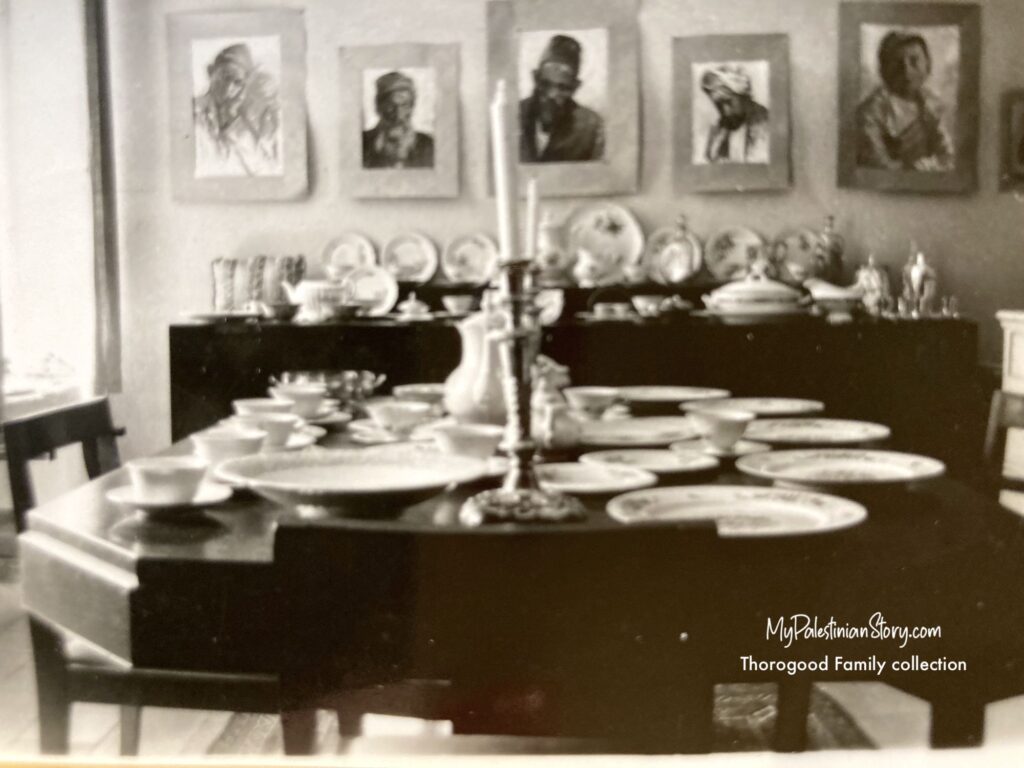


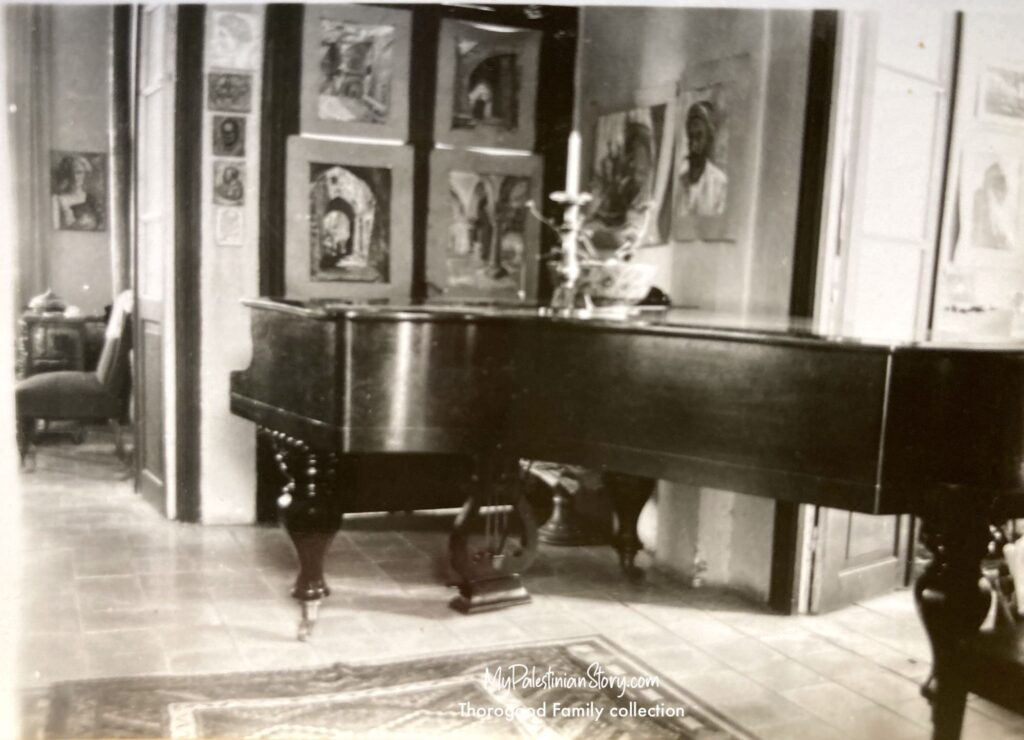

(Thorogood Family collection, via Cathie Cahill)
The family had what Feely characterises as a very English lifestyle. She remembers evenings by the fireplace, with bread being toasted at the end of a long fork, and cups of tea. Bill was a quiet man. Marika, very sure of herself, would run the house and take excellent care of Erifeely. Feely talks with zest about her aunt and remembers her as a most refined person, kind, generous, dedicated to her mother and her family, and very artistic.
The youngest of the Gaitanopoulos children, Evangelia (b 1910), was very close to her sister Marika, throughout their lives, and similar in some ways: refined, artistic. She wrote beautiful poems.
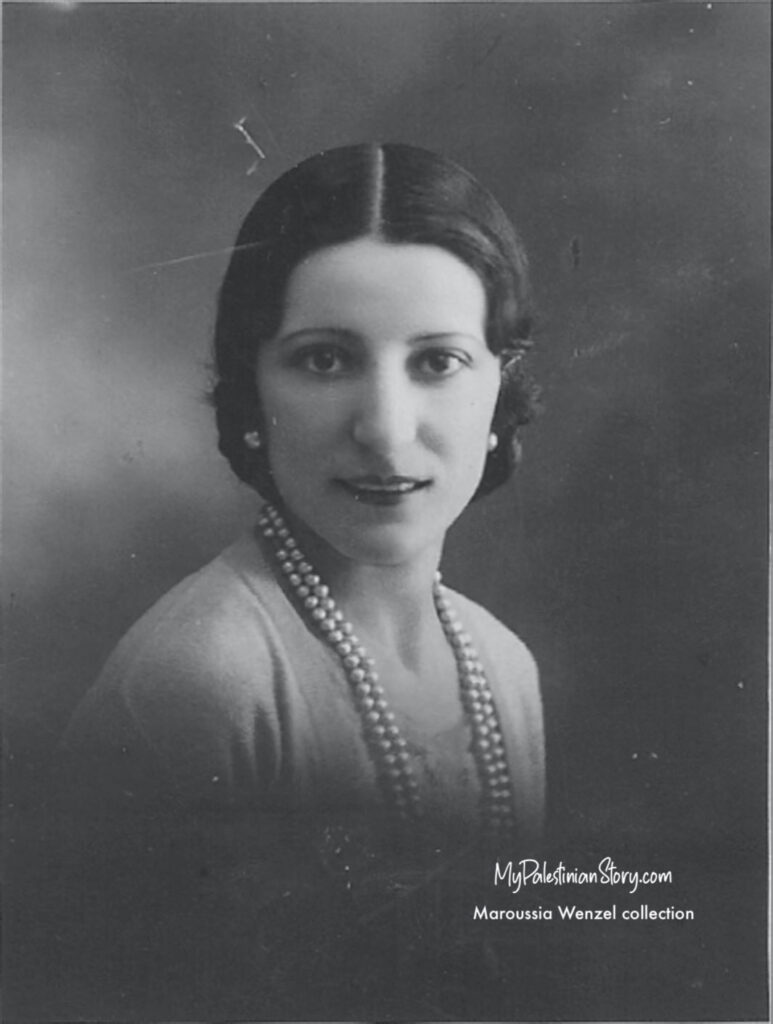


Bill hired her as a typist at the office and that’s where she met Clifford Price, a British soldier. They married in Jul 1941 and went to live in a Jewish neighbourhood. Their son Charles was born in 1942. Three years later, the couple left for England.
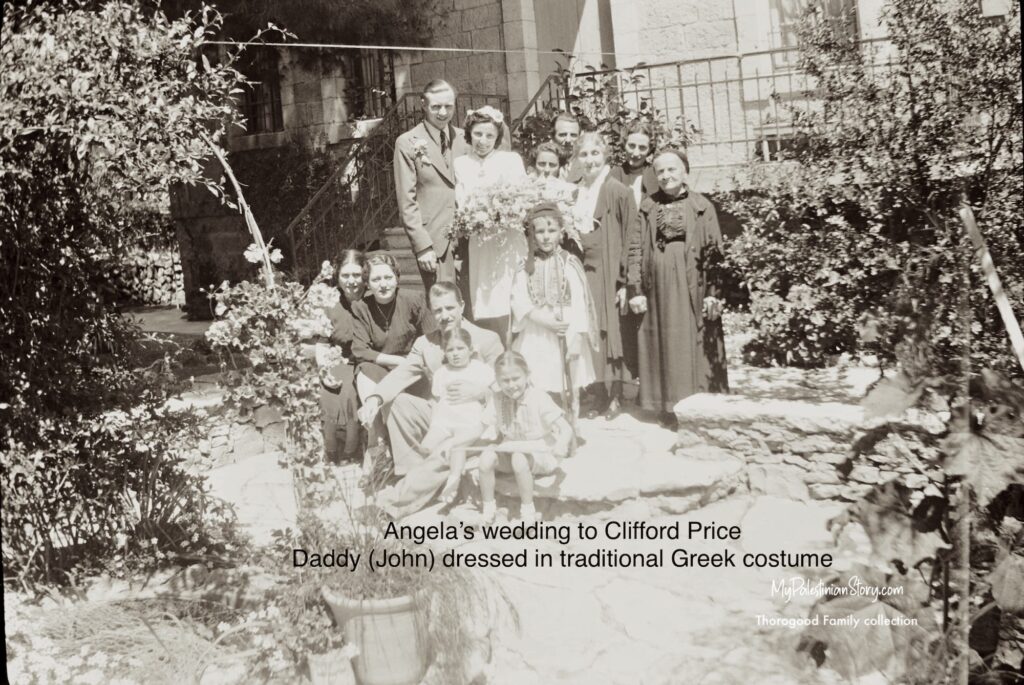
(Thorogood Family collection, via Cathie Cahill)
There was also a dog in the family called Hector. He’s pictured with Evangelia in a photo in Maroussia’s collection on the back of which Efthymios wrote: “Hector was born on 4 April 1933 and he’s a pure Alsatian. I bought him for 7 pounds Evangelia is stunned by his beauty… He greets with whichever hand you ask him to, kisses hands, fetches the ball, lies down when you order him to and he’s a terrible thief of furs, shoes, and wreaks havoc with the neighbours’ hens. …”

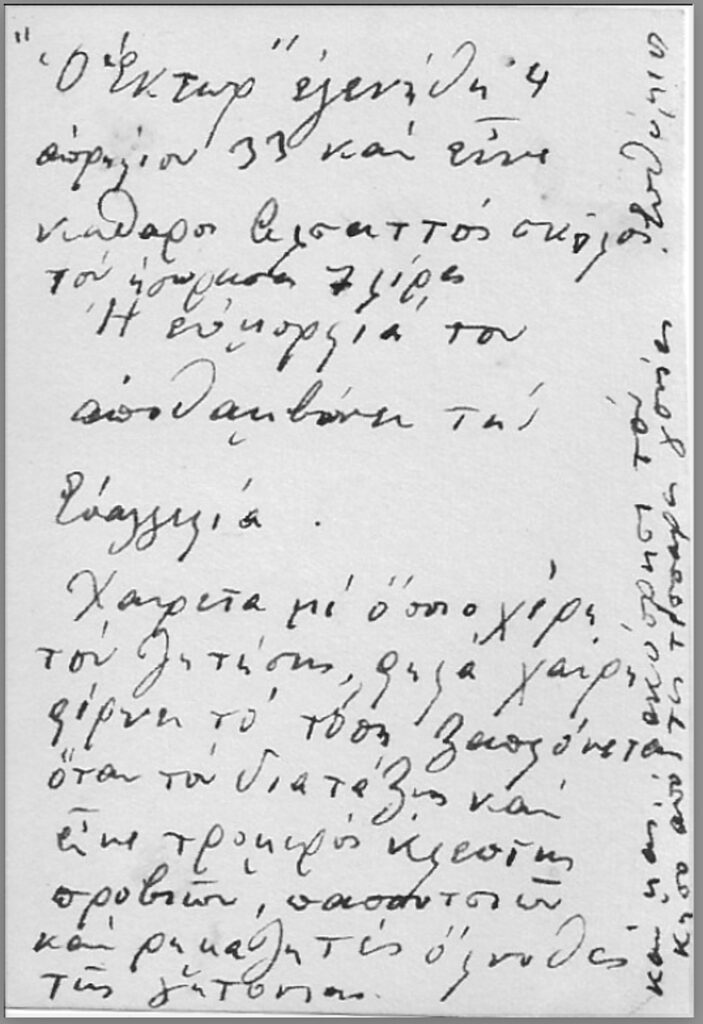
Bill Thorogood retired in 1940 and was presented with a silver cigarette box (later stolen from Trinity Rise). As a retirement project, he financed Nando Schtakleff, brother of Marika Schtakleff-Gaitanopoulou (and my great-uncle), when he took over a cinema in the German Colony and rebranded it as the Regent. (For more details about the Regent Cinema, see my post of 10 December 2018.)
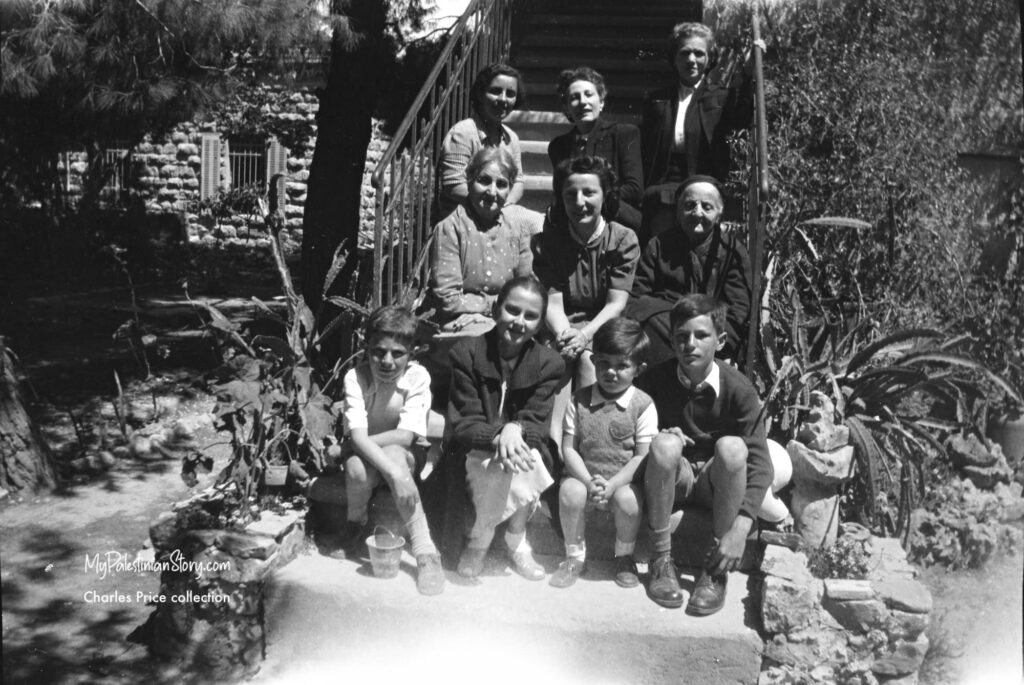
Top: Marika in the middle, Anna on the right
Middle row L->R: Erifeely, Angela, Kalliope
Bottom L->R: Unknown, Maroussia, Charles, John
(Charles Price photo collection)
Dispersal
The end of the Second World War signalled also the end of a lull in the tensions amongst the communities vying for control of the land of Palestine. Bill decided to move his family to calmer shores. In the spring of 1946 he liquidated all his affairs and, narrowly missing the bombing of the King David Hotel that July, returned to England where the house on Trinity Rise eventually became the family’s new home.
The rest of the Gaitanopoulos also scattered in 1948 with the outbreak of war:
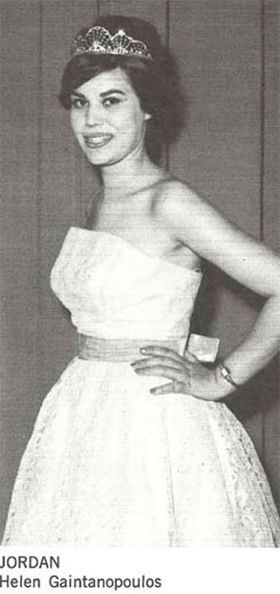
Miss Jordan 1960
(From the Miss Universe programme, via Syed Kamal).
- Panos took his family and Kalliope to the Old City. Kalliope stayed in Beit Jala where she eventually died while the family went on to Jordan. There, Panos opened two pharmacies with his Jerusalem partner, Theodoros Ninos: one in Amman and one in Zarka. Elenitsa was crowned Miss Jordan in 1960 and afterwards represented the country in the Miss Universe contest. She married a Greek man from Egypt by the name of Xenakis who was a hairdresser to the Jordanian royal family. Later he sold his business and they moved to Greece where they live to this day.
- Theodor Solodkoff took Eleni and Maroussia to his native Russia. Maroussia’s parents died in Russia as did her first husband. She then married a Lebanese man and moved with him to Beirut to take care of his three daughters abandoned by his previous wife.
- Efthymios with his family left Jerusalem after the bombing of the Semiramis Hotel in 1948. He was first posted by Gresham Insurance to Cairo and then took over the Cyprus office. Feely married Stavros Antipas, another Greek Jerusalemite, with whom she eventually settled in Canada. Jenny became a famous dramatic actress, the diva of Cypriot theatre (did I say there was a lot of talent in the family?), and married Evis Gavrielides, a theatre director, also a huge figure in theatre. (At some point I’ll have to write a separate post about this particular branch of the Gaitanopoulos.)
- Angela (Evangelia) and Clifford Price went to England with their son Charles. After spending some time in Africa and having a second son, Richard, the couple divorced. Angela and Richard (whose middle name is Anthony after one of Demetris and Erifeely’s children who died young) stayed with the Thorogoods at Trinity Rise for some time and then lived close by.
- Erifeely stayed in Jerusalem where she died in 1952.

(Thorogood Family collection,
via Cathie Cahill)
In the late 1950s John emigrated to Canada where he met Janet, a fellow British immigrant. They married in 1959 and had three Canada-born children, Cathie, Alex, and Marika.
Bill died in 1966 and Marika joined her son’s family in Canada in 1967. But she wasn’t happy there, hated the cold, felt she didn’t fit in, and wanted to return to the house on Trinity Rise which was sitting empty. So the whole family returned in 1970 and a fourth child, Austin, was born shortly thereafter.
John’s younger daughter, Marika, remembers her namesake grandmother as follows:
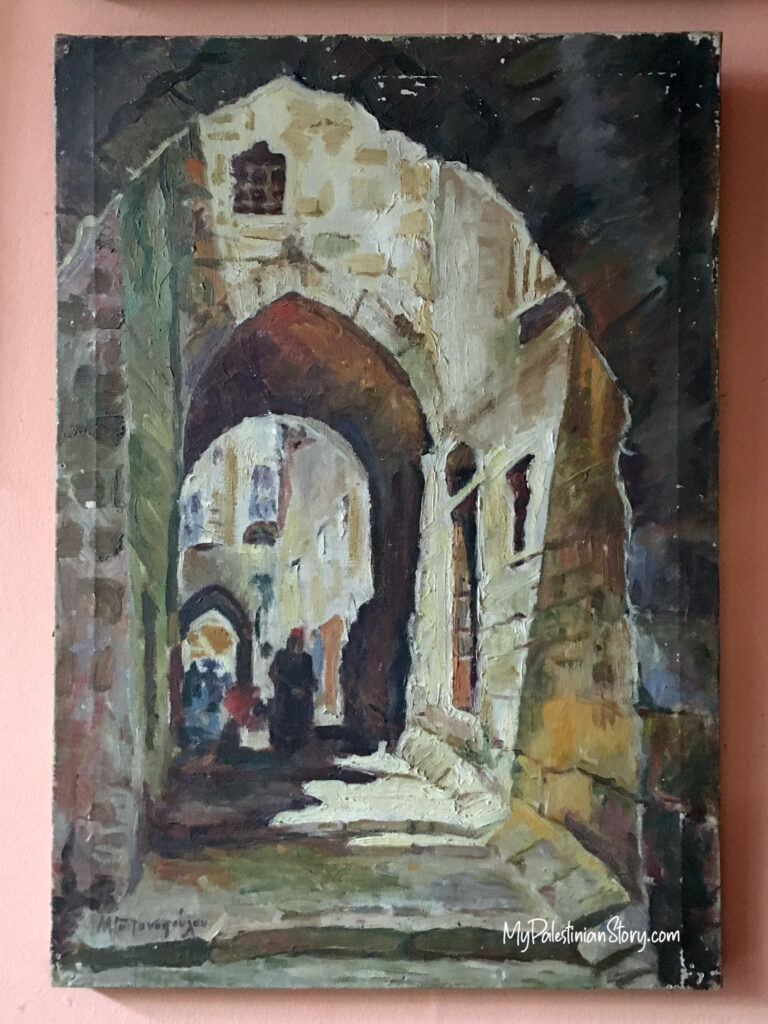
(Photographed at the Thorogood home – Jun 2017)
As a child, I was very close to my granny Marika and used to sit in her sunny bedroom/living room/studio with her paintings and art books, while she told me stories of Jerusalem and her family, and how much she missed it. I also knew Angela well as she lived at the top of the road. They were both very kind, loving—and religious. Marika would pray over our beds in Greek every night, doing the sign of the cross over and over again. She knew many languages—Greek, English, German, French, Arabic and Hebrew—a reflection of Jerusalem at that time!
Marika enjoyed painting almost to the end of her days. In her 60s she went back to school and got a degree in painting from Camberwell College of Art in London. In later years she had a licence to copy paintings at the National Gallery and she preferred to do that rather than paint at home. She died in March 1983 and was buried at West Norwood cemetery where her husband’s cremated remains are.
John Thorogood
John worked in real estate, creating an eponymous agency in London now run by his youngest son, Austin.
As I did not know him well enough to do justice to who he was, I’ll let his children’s words do so.
Cathie had this to say about her father, with input from her siblings (lightly edited):
My father had three identities—Palestinian, Greek and English. They were all deeply embedded in him and therefore shaped the consciousness of his children, their spouses and his grandchildren.
As a child, teenager and even young adult, I couldn’t understand why my father wasn’t like my friends’ fathers, who were mostly quiet and reserved Englishmen. My dad was animated, passionate, sentimental, argumentative, quick-tempered, emotional, a very generous host, and he played loud music! It wasn’t until years later, after I’d had my own children and moved to Australia, that I understood how dominant the Greek and Palestinian aspects were in him.
Our Greek granny, Marika, lived with us throughout our childhood. She and her sister Angela told us many stories about their life in Jerusalem, and we were surrounded by Granny’s many beautiful paintings of the Old City and its people. Loud arguments in Greek were part of the soundtrack of our childhood, as well as the Greek music my father often played. My father loved cooking Greek and Middle Eastern dishes for family and friends. Our friends still talk about the platters of hummus, babaghanoush, fatoush, tabbouleh, stuffed vine leaves and other delights that he would prepare for them.
John’s four children and twelve grandchildren have many varied memories of life with him. He could be a formidable parent or a complete softy. He demanded respectful behaviour and manners from us, and in return he could be so much fun. His children and then his grandchildren were in turn frightened by the spectre of Baboula* who lived in the loft and the ghost stories he told. He taught us about music, food, wine, culture, cars, photography and so much more. He instilled in us his sense of humour, his love of The Marx Brothers, Laurel and Hardy, and Sylvester the cat. He gave us every support possible when we were in trouble or strife, always generous.
Our childhood was very strongly influenced by his love of the Mediterranean. After our return from Canada in 1970, there were many family holidays on Lesvos, the island of his ancestors. My mother was the calm Englishwoman who understood his fiery nature and shared his love of the Mediterranean. They spent many holidays exploring Greece together, eventually building a house near Mytilene, on Lesvos, where he was known by the locals as ‘the Englishman’.
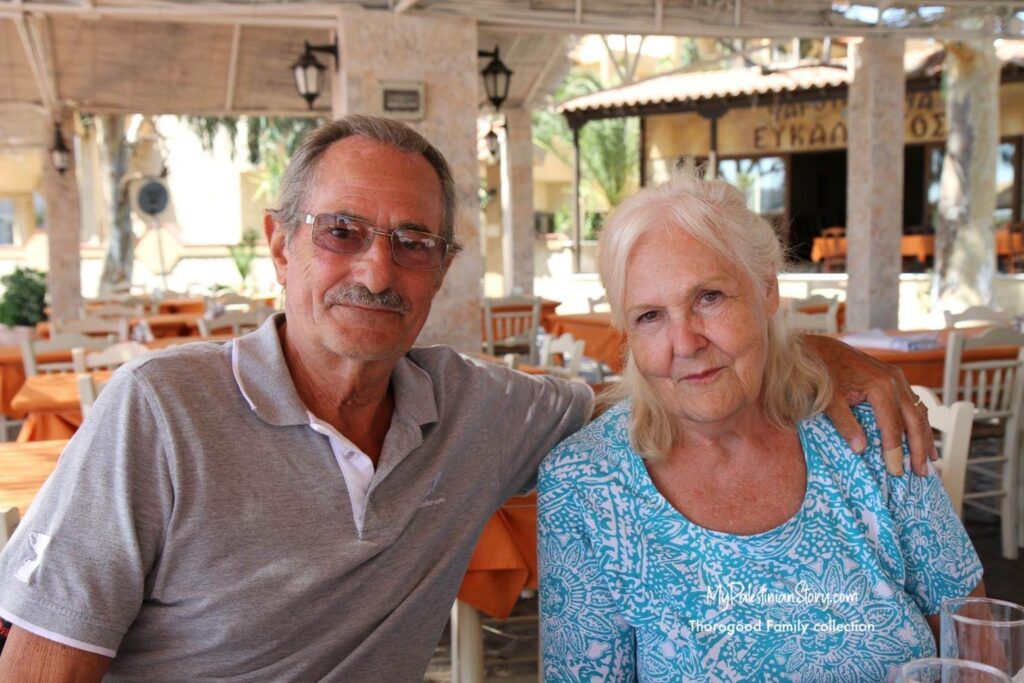
(Thorogood Family collection, via Cathie Cahill
John also instilled in us his great love and care for animals. Our family had many pet cats and dogs over the years and often rescued waifs and strays. At one point my parents were travelling every summer between London and Lesvos with six cats and a dog. Several of them are buried there and others in our garden in London. John and Janet used to feed many strays near Mytilene, even treating them for ticks and fleas. John adopted a stray dog there in 2003 and took her back to London. For the next 14 years of his life, she was his most beloved companion and he was inconsolable when she died.
He remained passionate and emotional about his Jerusalem childhood throughout his life and supported the cause of the Palestinians who had not been allowed to return to their homes after the 1948 Nakba. John never did return to his birthplace, the ancestral family home in Jerusalem, preferring to remember his happy childhood there.
And yet, as a child in Jerusalem, he had been a witness to war, violence, displacement, fear, terrorism, and the anxiety within his own extended family as many of them prepared to leave for countries all over the world. The grief of his mother, after leaving her beloved Jerusalem to make a new life in a grim post-WW2 London, also affected my father as an only child and he felt a very strong responsibility for her for the rest of his life.
My father’s Jerusalem childhood never left him and he has passed that passion down in so many ways to so many people.
(* All Greek parents call upon the mythical Baboula to help keep their children in line. A reminder that Greeks invented drama, not psychology!)
Finally, Austin posted a lovely tribute to his father on the company’s website.
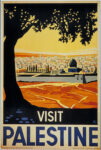
John will join his parents at West Norwood cemetery on 15 Sep 2022. His final attire will include a T-shirt stamped with the well-known Visit Palestine poster published by the Tourist Development Association of Palestine in 1936.
A Greek wish for the family:
May you be well so you can remember him.
(Να είστε καλά να τον θυμάστε.)
❖
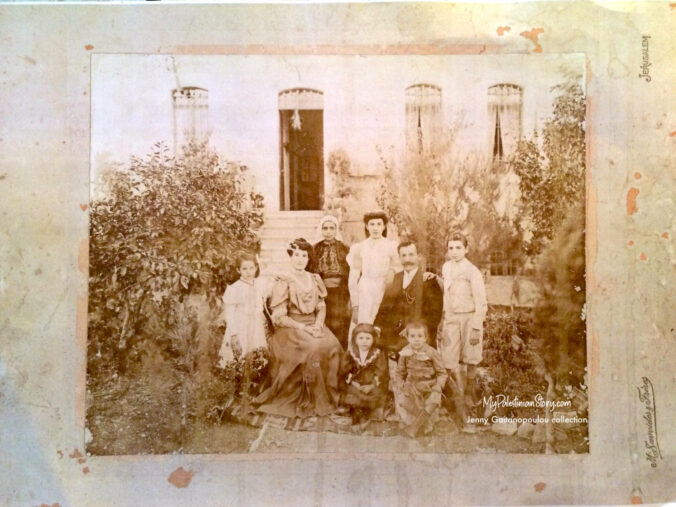


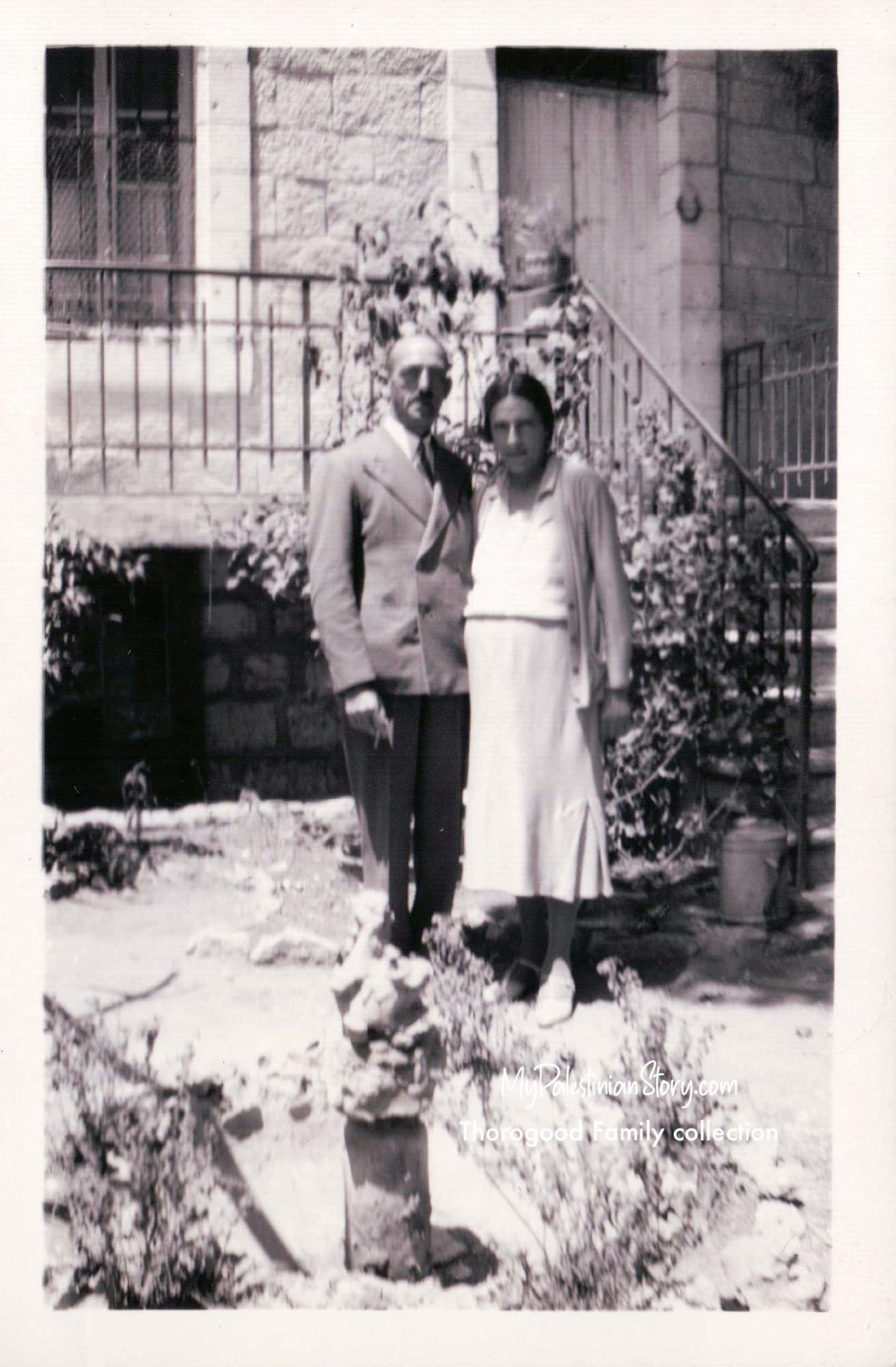
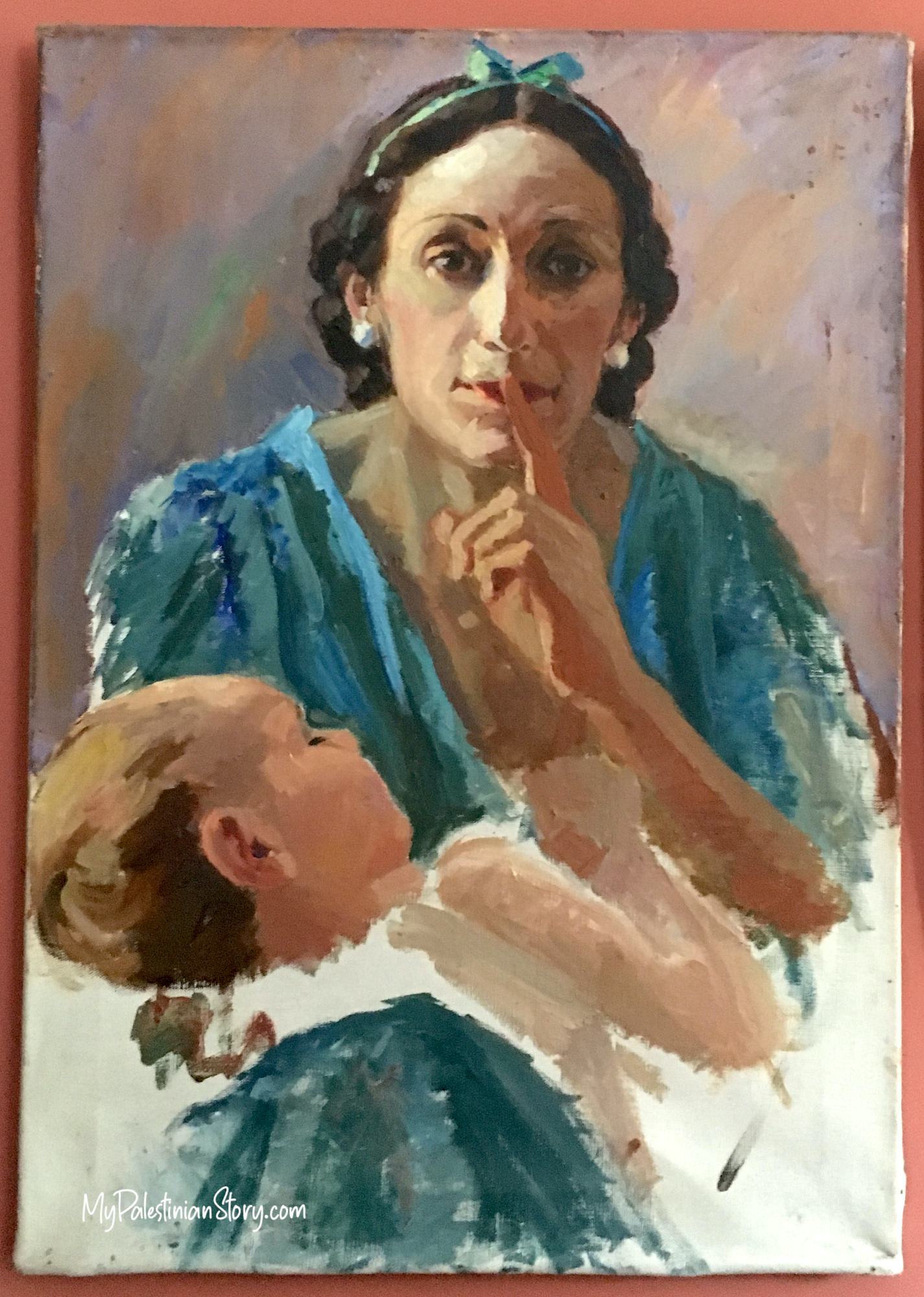


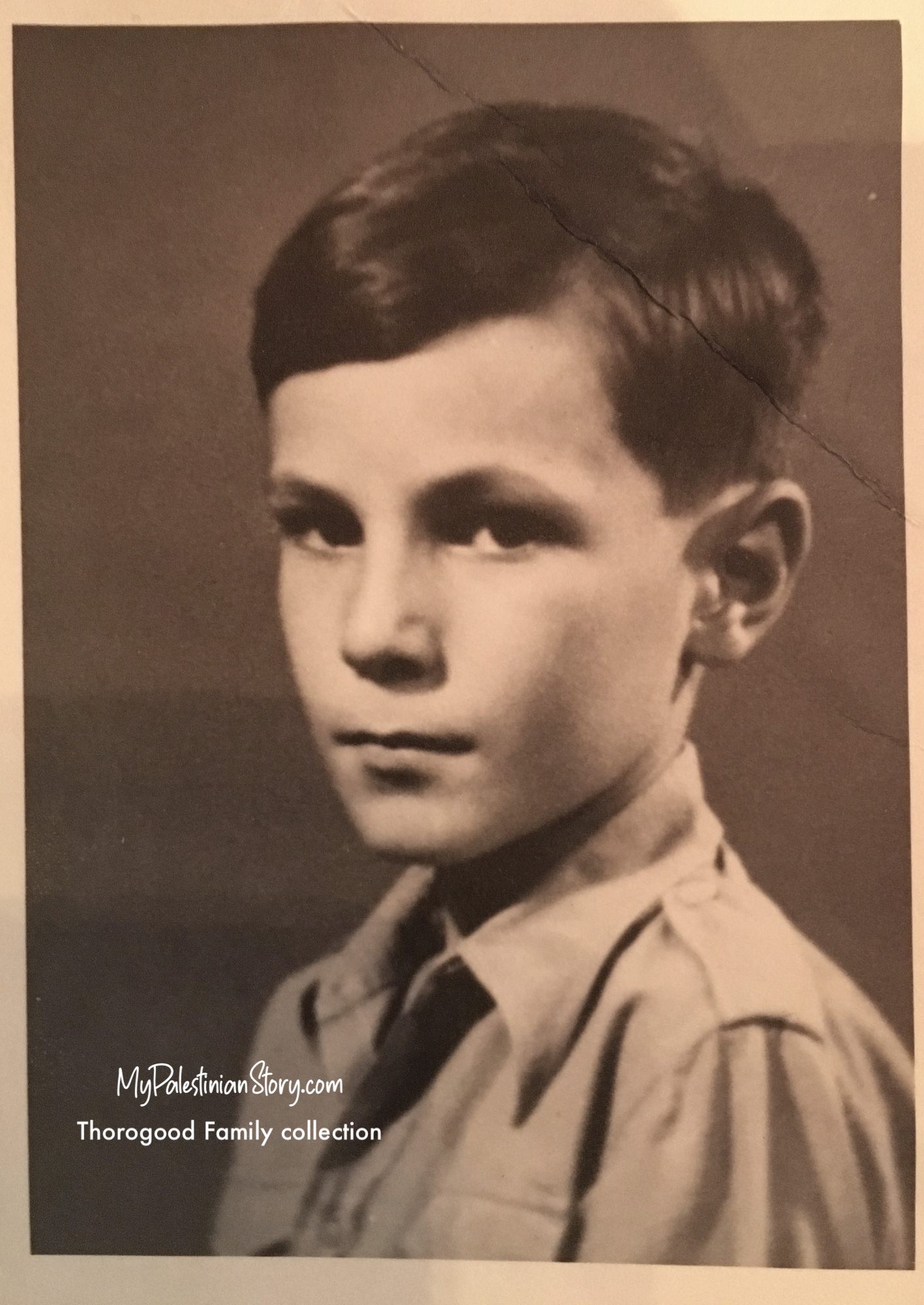
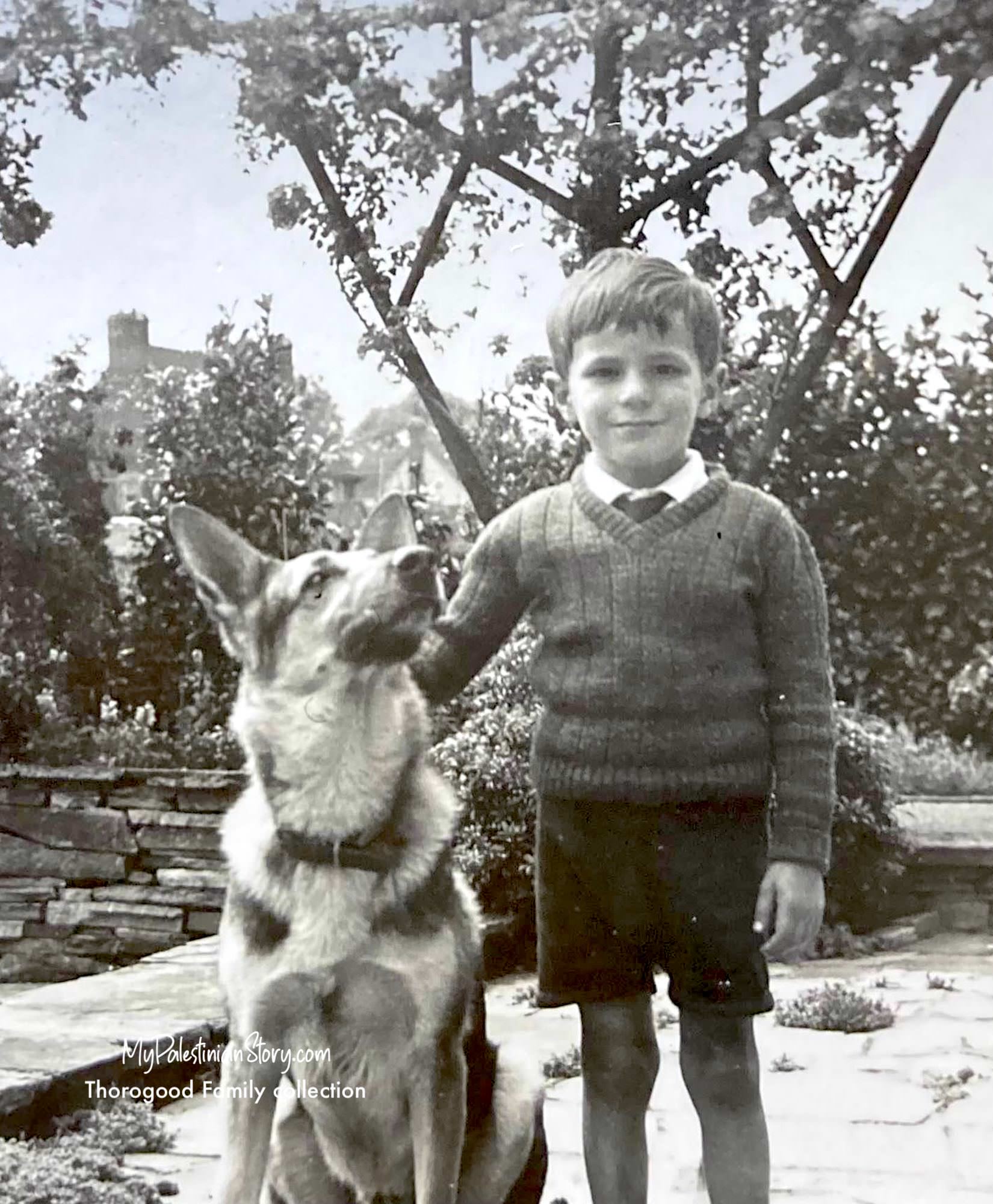

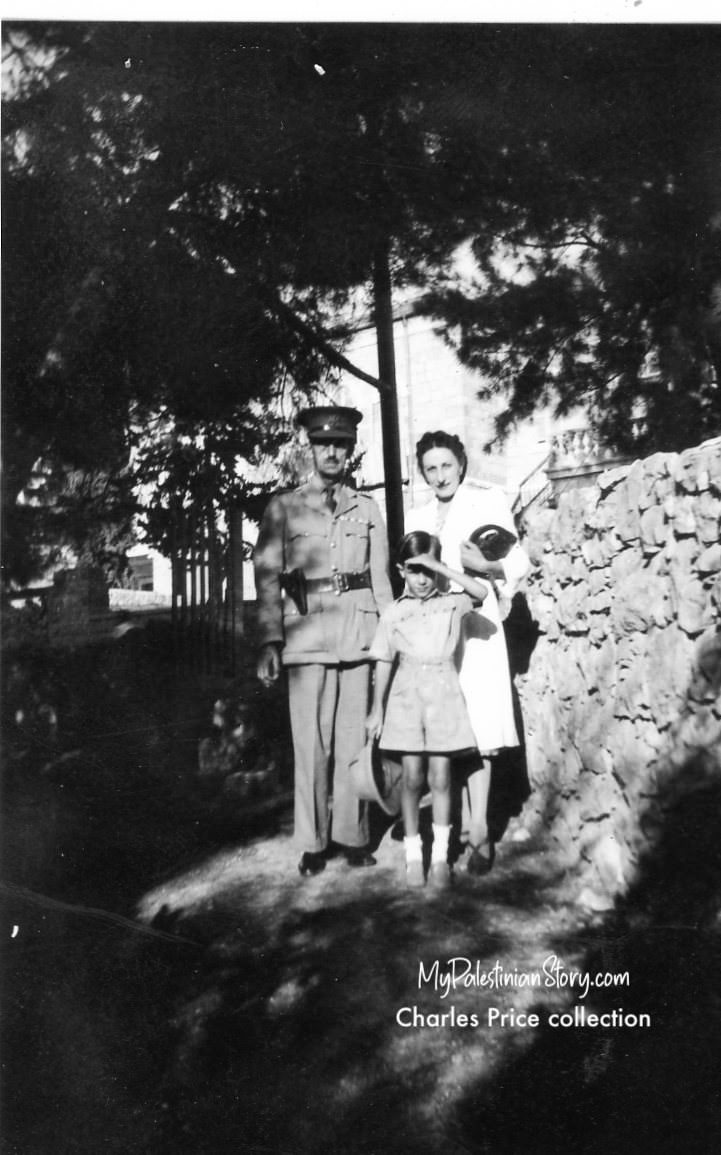


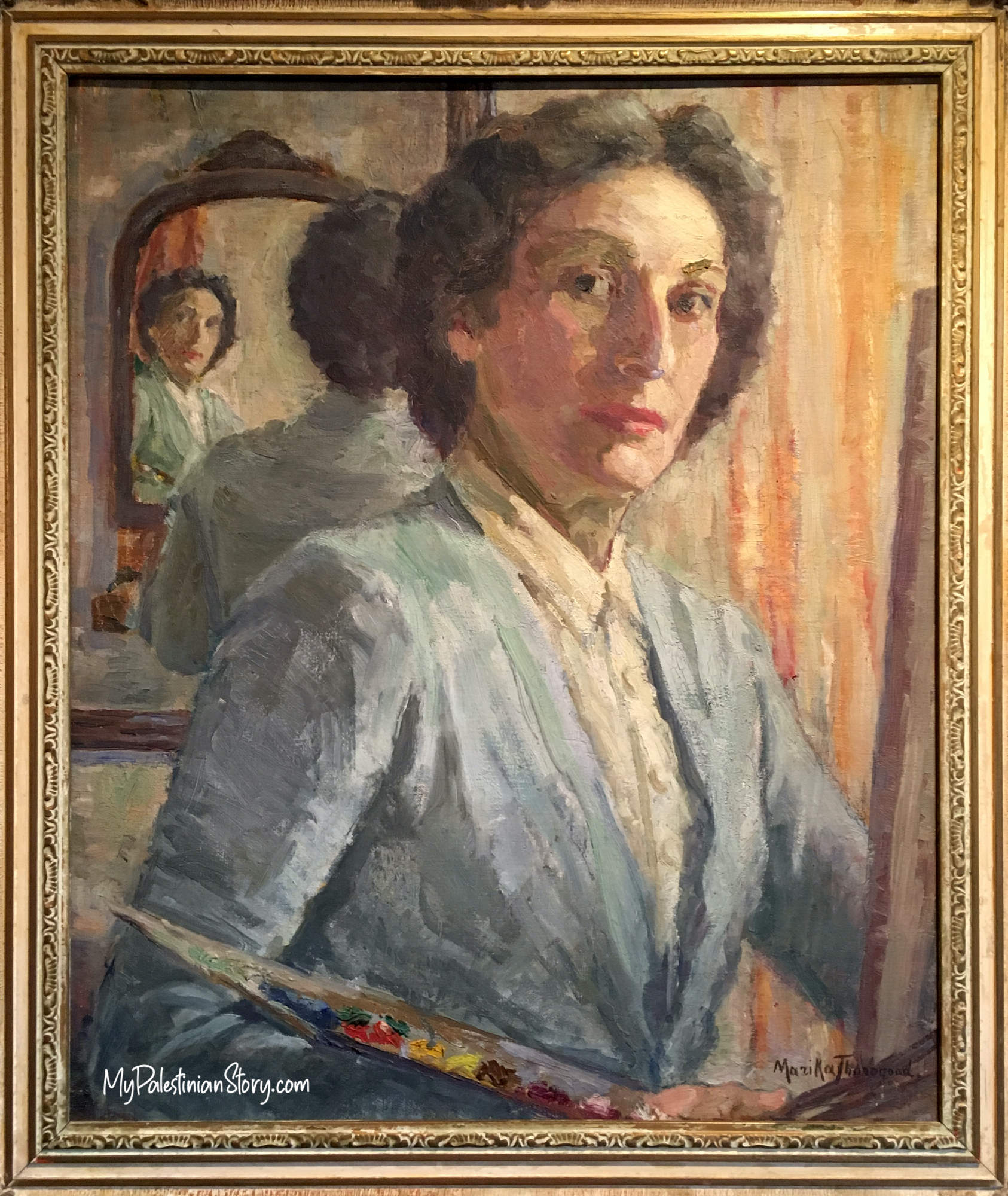
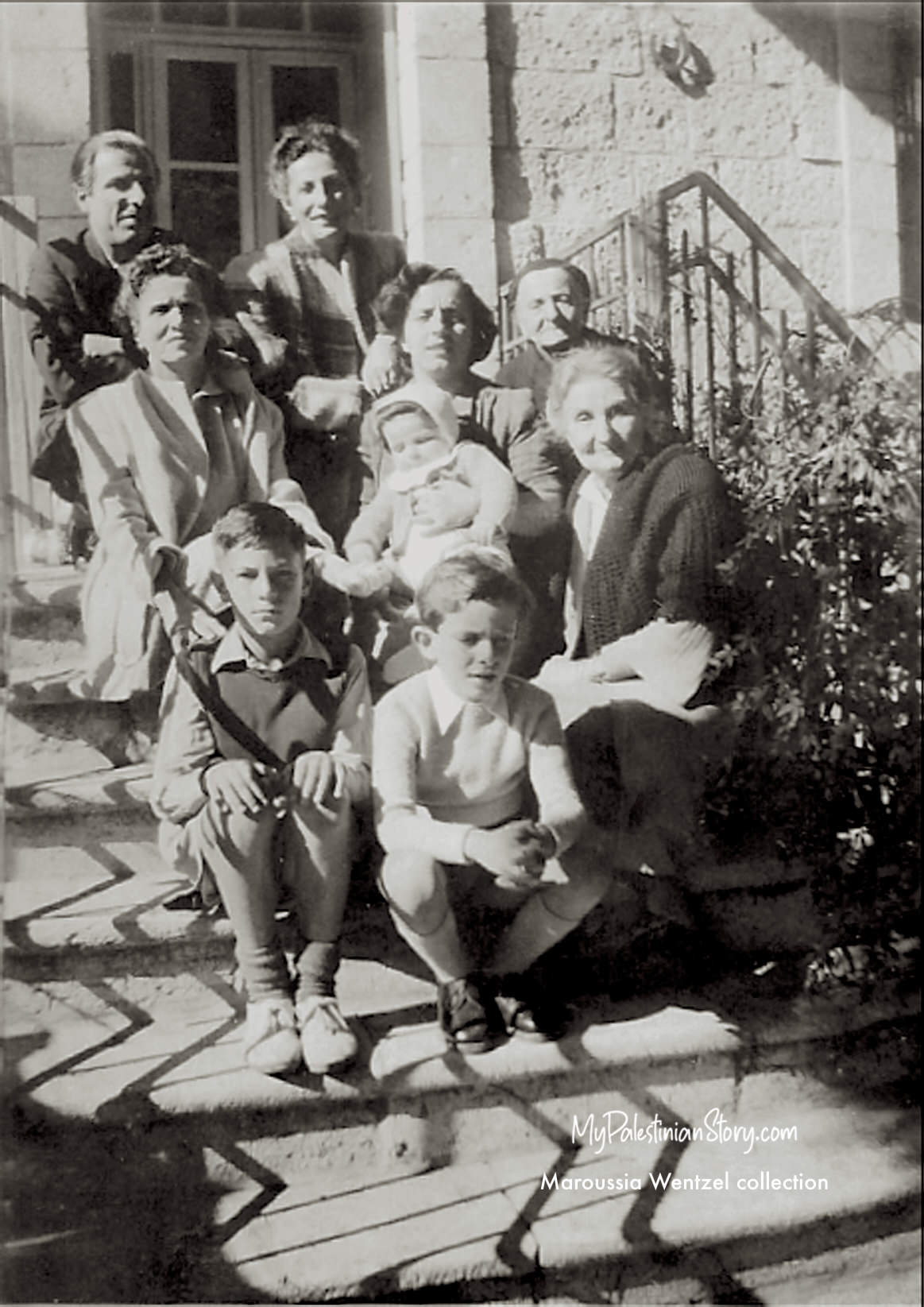
Dear Marina,
Thank you for writing the story of my grandmother Marika’s family history and of my father John, and for showing her beautiful paintings. Marika
My thanks to you, Marika, and the rest of your family for entrusting me with this story. In the process of writing it, I developed an admiration for your grandmother, in particular.
Dearest Marina – We enjoyed every minute reading your illustrious and moving Gaitanopoulos & Thorogood tribute . Mum and I took a journey back in time in epic proportions with LOVE in our hearts . What a gift. Thank you dear cous – thank you.
Hugs,
Feely & Corinna
Thank you to both of you for the love and support. Much appreciated! Thanks in particular to Feely for being so generous with her time and for all the information she’s been giving me, not just for this post, but always.
Enjoyed your article, and having visited the Bakaa neighbourhood , and spent weeks living next door to Memelo got to appreciate the stories I heard from my father and uncles concerning the post war years in Jerusalem .
Thank you, Stavro. Much appreciated!
I loved it. I also visited the baqaa house as a child with my mother Elenitsa Ghatanopoulou and it brought back lovely memories. I am also very attached to Greek and Palestinian roots and the Middle East in general as my Greek father Andonis Xenakis lived in Cairo then Jordan and my husband Hanna Farah is from Palestine.
May John rest in eternal peace.
Chloe Xenaki Farah
Thank you for reading and taking the time to write, Chloe. I’m thrilled that you liked it. Please give my very best to your parents and keep in touch.
Thanks so much for sharing your memories!
Cathie (John’s eldest daughter)
Thank you for sharing your memory. I’m FB friends with your mother Elenitsa who sometimes speaks with my mother Janet in London. Lovely to know of you! Do you and your husband also live in Athens?
Kind regards,
Cathie (John’s eldest daughter)